This section highlights people, events, active protests, and reactions that are central to the Civil Rights movement within the Bucknell and Lewisburg communities.
At the Local Scene: Black Students at Bucknell
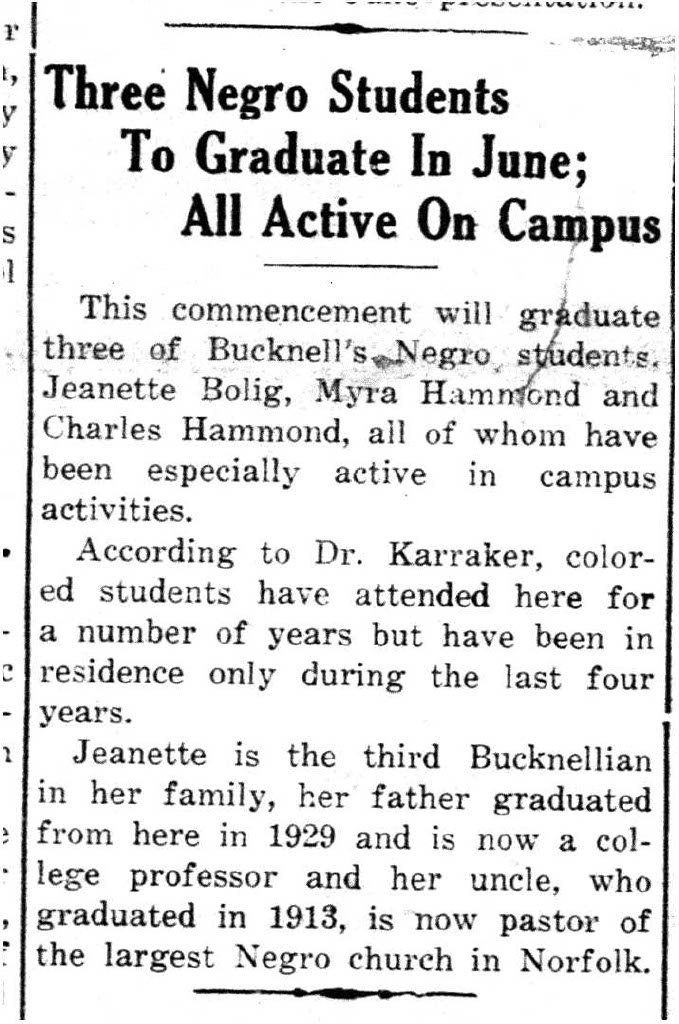
Start of a Legacy?: Three Civically Active Black Bucknellians
This article from a May 1949 edition of the Bucknellian celebrates the upcoming graduation of three black students, all of whom were significantly active on campus. Namely, the article cites students Jeanette Bolig, Myra Hammond, and Charles Hammond, and expands more greatly on Jeanette Bolig, due to her family’s legacy at Bucknell. Bolig’s father graduated from Bucknell in 1929 and later became a college professor, and her uncle, who graduated in 1913, became the pastor of one of the largest black churches in Norfolk. By discussing the shared achievement of three students, the article attempts to briefly draw a legacy of black student representation at Bucknell University. Their success at the time was significant and to many, shocking.
Resolution of Interfraternity Council on Discrimination 1954
This official university resolution from April 1954 asserts the goals of fraternities and sororities as fostering “understanding between men and nations” and therefore finds restrictive, discriminatory clauses in their charters to be antithetical to their purpose on campus. It is agreed that no new social groups will be allowed on campus if their purposes are discriminatory, that a committee will be formed to help reform Greek selection processes, and that copies of this resolution will be sent to these groups’ national offices and the National Interfraternity Office.
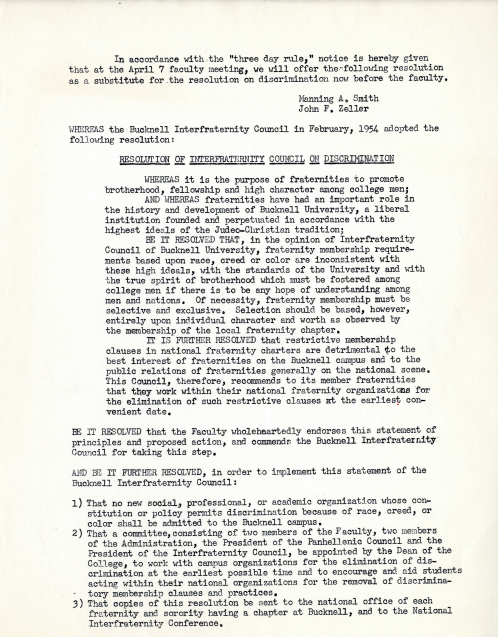
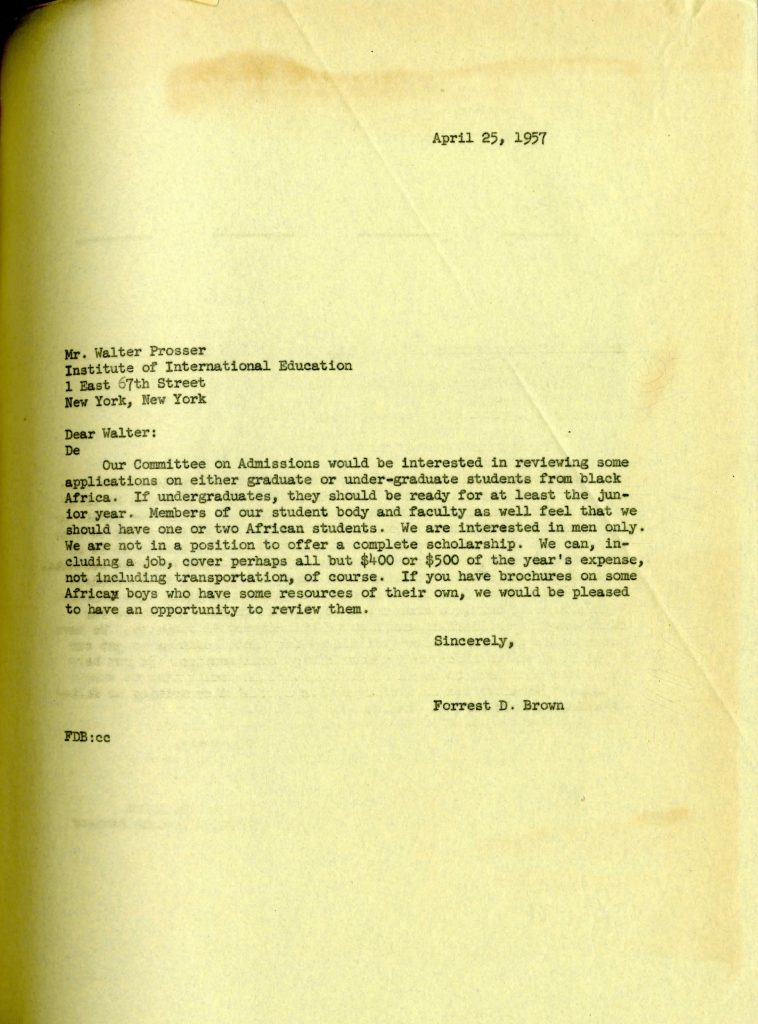
Correspondence re: African Student
Within these official university correspondences from April 1957, Forrest D. Brown (Bucknell Foreign Student Advisor) sends out advertisements to two different educational bureaus looking for applicants to Bucknell. More precisely, Brown cites Bucknell’s desire to have one or two black African students, preferably at the graduate level. However, they would consider an undergraduate either at or above the junior level. While Brown notes that Bucknell is only able to offer a partial scholarship to these incoming students, in his letter to Walter Prosser at the Institute of International Education, he also puts forth an enthusiastic call for students already equipped with financial resources. Because of that, the correspondence with Prosser demonstrates the intersection of both race and class issues in the effort to diversify Bucknell’s campus.
“Negro Discrimination — Problem in the North”
This October 1959 Bucknellian article discusses the pressures used to restrict the vote of African Americans in the South, such as poll taxes, requirements of “good characters,” extensive registration processes, etc. Sharing this information sets the author up to advertise for a debate on the subject that will take place at Bucknell between Southern journalist Frank van der Linden (1919-2011) and NAACP Program Coordinator and original Freedom Rider, James Farmer (1920-1999).

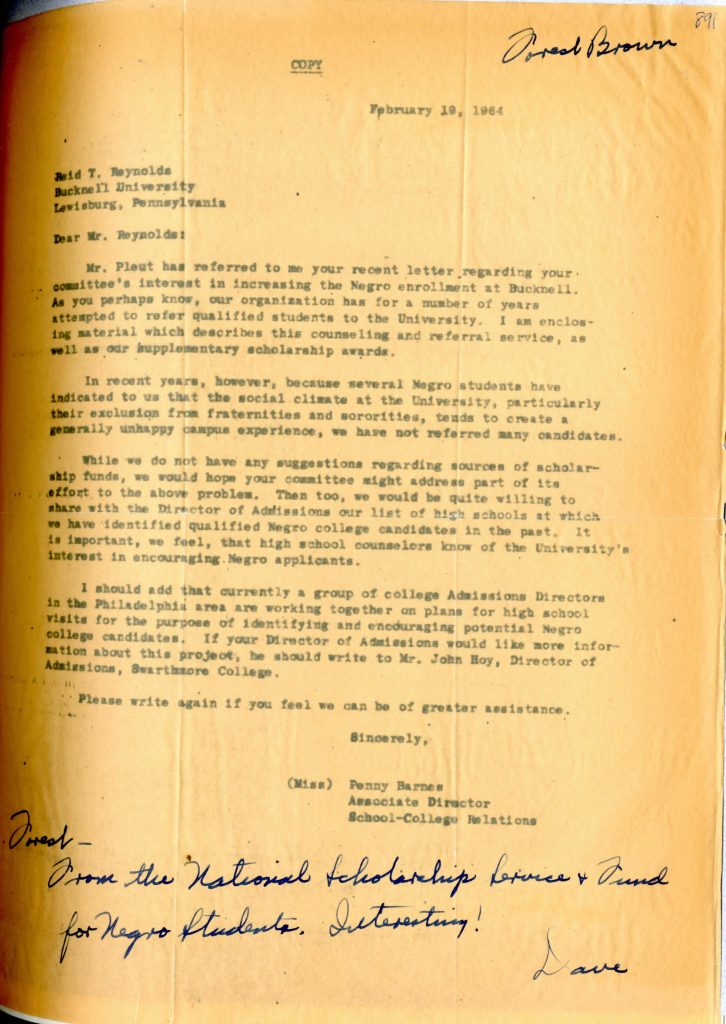
Increasing Enrollment of Black Students
This 1964 letter from the National Scholarship Service and Fund for Negro Students (NSSFNS) discusses why the organization has not been referring many black students to Bucknell, despite the university’s interest in increasing the enrollment of black students. Namely, they note that several students are unhappy with their experience, citing a hostile social climate as a significant contributing factor. The discrimination these students encounter upon their exclusion from sororities and fraternities is a key issue informing their negative experience at Bucknell. The NSSFNS then implores Bucknell to solve this issue if they wish to receive further support from the organization in increasing the enrollment of black students.
Fund to Pave Way to College for More Eligible Negroes
This press release from June of 1964 discusses a new $150,000 grant provided to the National Scholarship Service and Fund for Negro Students (NSSFNS) by the Old Dominion Foundation. Aimed to provide college opportunities for underprivileged black students, the grant seeks to expand upon the “Hoy Plan”—an initiative invented to attempt in helping disadvantaged students actualize their potential. The desired outcome of the “Hoy Plan,” in combination with the added grant, is to provide motivation, financial support, and courage to black students applying to colleges perceived as being for “the white.”
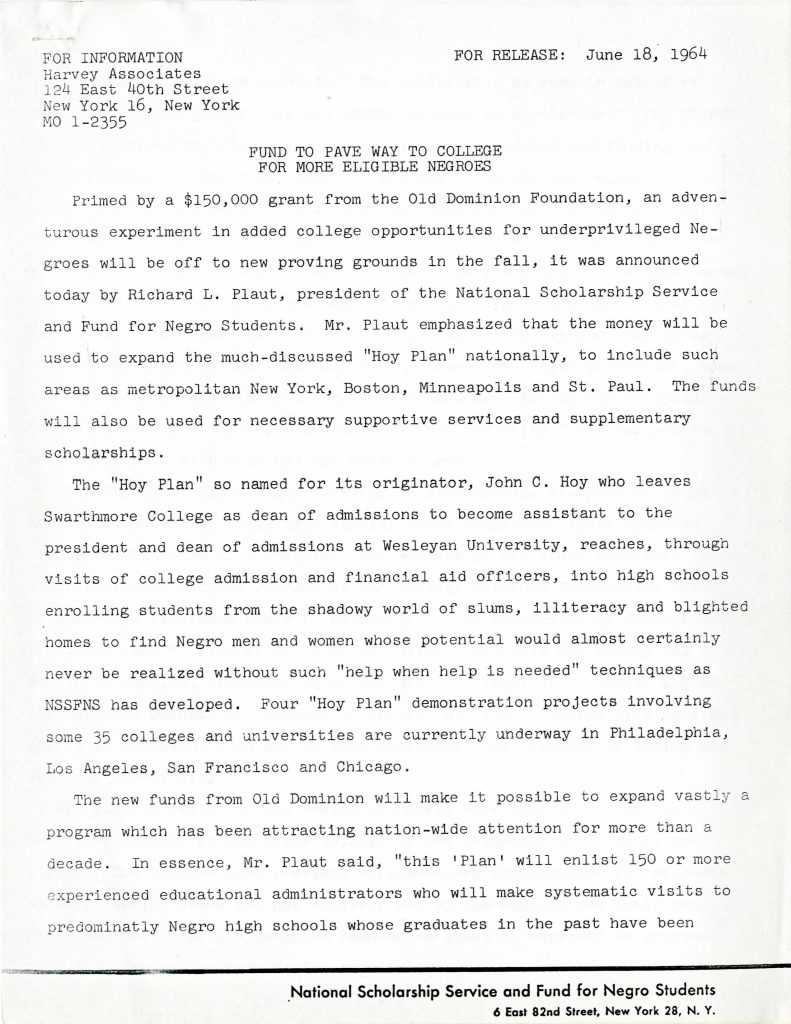
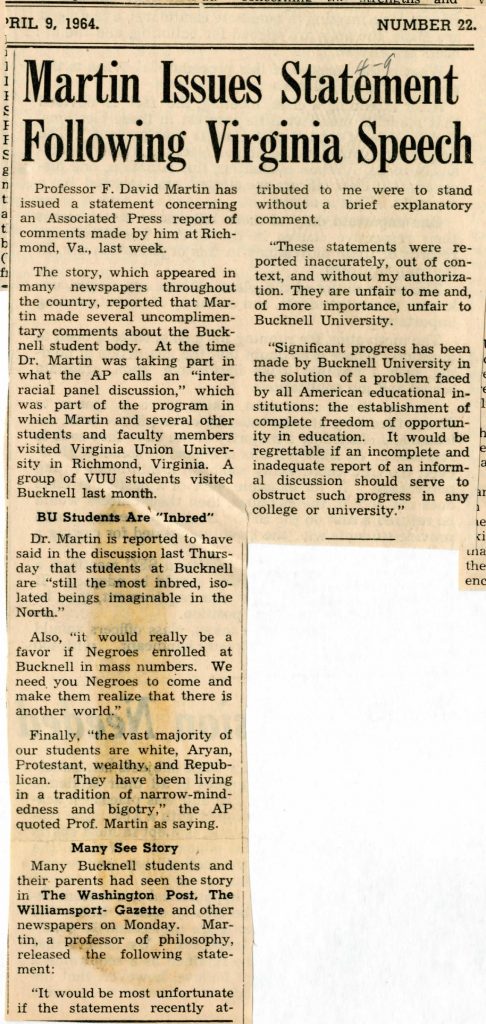
Bucknell Professor Speaks Out Against Segregation at the University
These three clippings from various 1964 editions of the Bucknellian highlight deficiencies in Bucknell’s response to racial justice issues on campus. Noting both the problems and potential solutions, the article highlights Bucknell Philosophy Professor F. David Martin’s comments regarding Bucknell’s homogenous campus culture, national pressures, and some of the initiatives that could be undertaken in order to solve the issue of black representation on campus. Primarily, Martin notes that fraternities and sororities are the driving factors of Bucknell’s social atmosphere. These organizations often discriminate against or exclude Black and Jewish students based on their organization’s national guidelines. This, in turn, prevents black students from wanting to attend Bucknell for fear of significant social exclusion. Because many fraternities and sororities are obligated to follow their national guidelines, these articles demonstrate how national pressures regarding race informed many of the decisions made on Bucknell’s campus. Additionally, the articles clarify a series of comments made by Prof. Martin that Bucknell’s students are “inbred” and “isolated” due to their lack of exposure to diversified people or life experiences. Though he clarified his intention with these comments, they do highlight the inherent homogeneity of Bucknell’s student body. This uniformity could be greatly diversified with the inclusion and social integration of non-white, socio-economically diverse students.
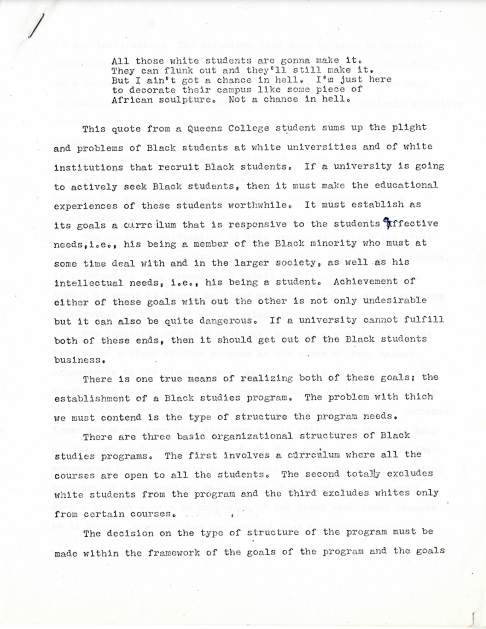
Memorandum to President Watts Re: Discrimination
In this official university correspondence, John P. Dunlop (1929-2013) (Dean of Men at Bucknell from 1962-1968; Dean of Student Affairs from 1969-1988) sends a memo to Bucknell President Charles Watts (1926-2001) (President from 1964-1976) concerning his own thoughts on discriminatory practices in social fraternities and steps they should take. He thinks that the issue is hard to address with concrete evidence, so he requests the presidents of each Greek organization submit their written consent to University standards. For those groups that do not provide written consent, Dunlop advocates that Bucknell drop the group and cease recognition from each group’s respective national office or that University aid be extended to them so that they may be able to meet the appropriate qualifications.
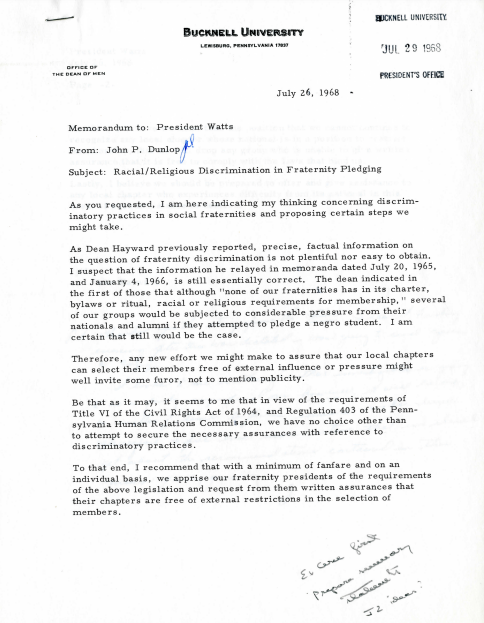
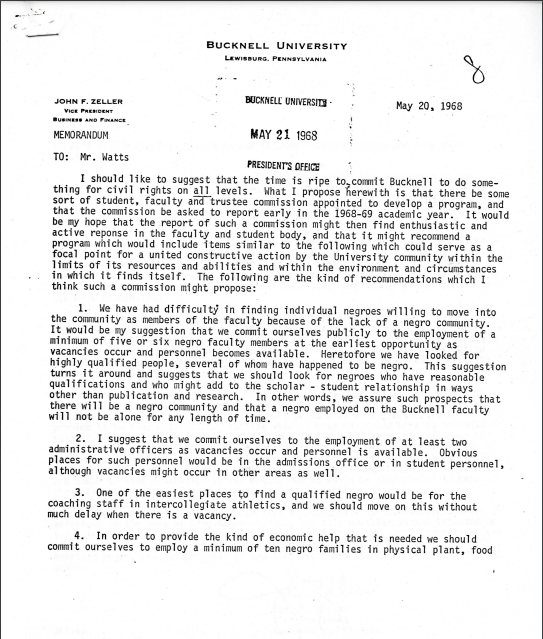
Correspondence Re: New Civil Rights Program
In this official correspondence from May of 1968, John F. Zeller (1919-2010) (‘41; Vice President of Bucknell from 1955-1984; Interim President of Bucknell in 1984) suggests to Charles Watts (1926-2001) (University President from 1964-1976) that Bucknell should “do something for civil rights on all levels.” He proposes a commission be appointed to develop a program to bring more black students and faculty to Bucknell in order to contribute to what he calls “the economic needs of the American negro.” His multi-tiered plan includes free housing for black families who move to Lewisburg and the immediate hire of 5-6 black faculty.
Student-Faculty Committee on Discrimination to Kappa Sigma 1955
This official university correspondence from March 1955 contains the Student-Faculty-Administration Committee on Discrimination’s letter to the Kappa Sigma fraternity, asking the delegates of their chapter to join forces with the chapters in the national organization that are trying to educate other chapters “concerning the moral and often the practical wisdom of eliminating discriminatory clauses and practices.”
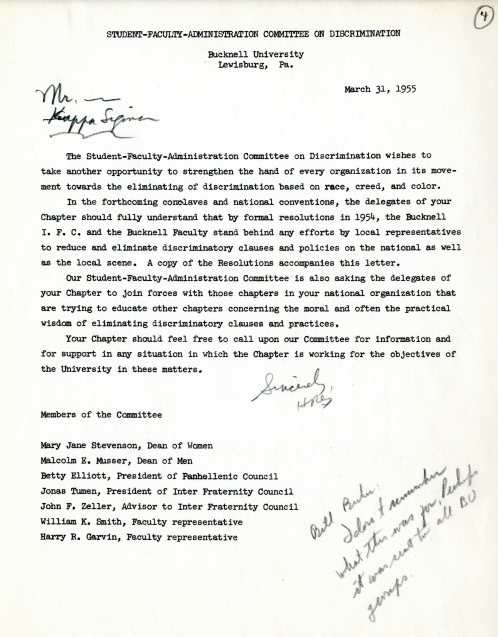
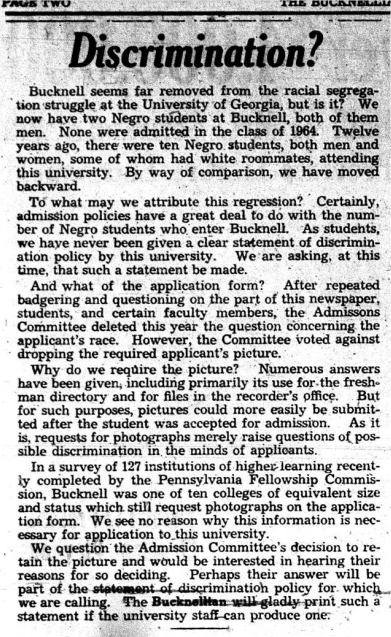
Discrimination in Admissions?: “Why the lack of black students at Bucknell?” 1961
“Why the lack of black students at Bucknell?” asks a current student in this February 1961 issue of the Bucknellian. The student speaks for others on campus concerned that admissions have actually regressed in its acceptance of black applicants. The author requests the release of a University policy on discrimination in admissions. They demand that the mandatory photograph submission be done away with on prospective students’ applications to Bucknell.
“Forum Debates Abuse of Negro Voting; NAACP Rep, Southern Journalist to Vie” 1959
This article from an October 1959 issue of the Bucknellian advertises an upcoming informal yet highly anticipated debate between NAACP’s (National Association for the Advancement for Colored People) James Farmer (1920-1999; original Freedom Rider) and southern journalist Frank van der Linden (1919-2011) regarding the abuse of African American voting rights. The article gives background information on both debaters, setting up their intellectual extremes in preparation for the upcoming debate.
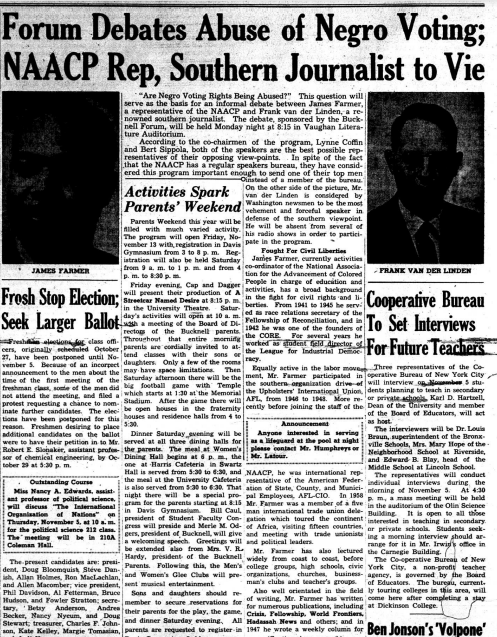
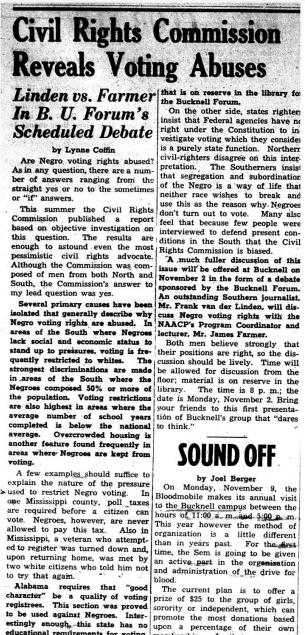
“Civil Rights Commission Reveals Voting Abuses”
This October 1959 Bucknellian article discusses the pressures used to restrict the vote of African Americans in the South, such as poll taxes, requirements of “good characters,” extensive registration processes, etc. Sharing this information sets the author up to advertise for a debate on the subject that will take place at Bucknell between Southern journalist Frank van der Linden (1919-2011) and NAACP Program Coordinator and original Freedom Rider, James Farmer (1920-1999).
“Walter, Eastland, and Arens Linked with Racial Group”
The author of this March 1960 Bucknellian article reveals the racism of Richard Arens (1919-2000), staff director of the Un-American Activities, who also serves as a privately paid consultant to a multi-millionaire interested in proving the genetic inferiority of African Americans. Arens is further exposed for saying that investigating hate groups proves fruitless due to their isolation and unimportance.
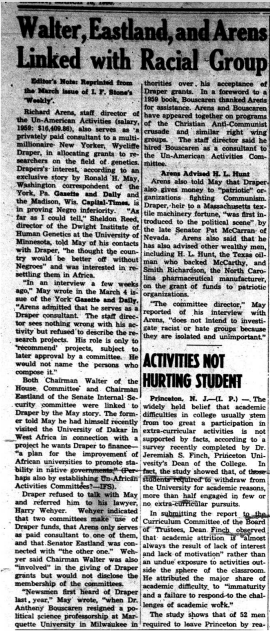

“Fraternity Men View Segregation” 1958
This article from a December 1958 issue of the Bucknellian looks at segregation in fraternities on campuses nationwide and what actions they are taking to usher in change. The newsletter’s call to action references and salutes the actions at the University of California, where fraternity men are actively working alongside the IFC to eliminate discriminatory clauses in their charters.
“Southern Integration” 1958
This article from an October 1958 issue of the Bucknellian describes the South’s attempt, across multiple states, to thwart the integration of schools. Taking examples from Louisiana, Virginia, the Carolinas, and Arkansas, the author describes southern resistance and its effects on school systems. Many schools were shut down for their failure to comply with integration standards, so the article also quotes locals who establish both their frustration with such enforcement and their understanding that states will have to comply with moving forward.
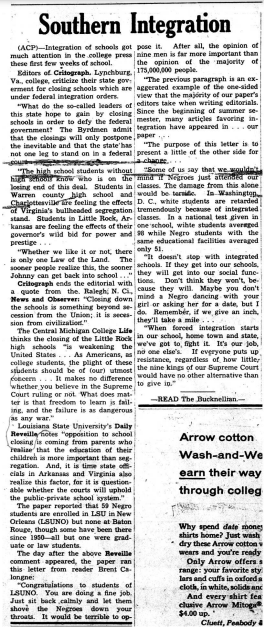
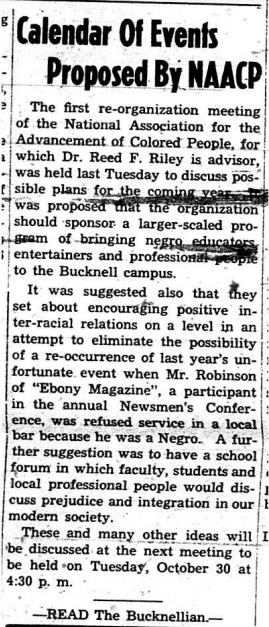
“Calendar of Events Proposed by NAACP”
This Bucknellian article from October 1956 addresses the first meeting of NAACP (National Association for the Advancement of Colored People) of the semester that discussed possible plans for the coming year, hoping to focus on bringing black educators, entertainers, and professionals to campus as well as to encourage positive race relations. The author cites the past year’s issue with visiting speaker, Mr. Robinson from “Ebony Magazine,” who was kicked out of a Lewisburg bar due to his race, stating that they have to find a way to make sure that never happens again.
“Negro College Fund Directed by Duchine” 1953
The author of this December 1953 Bucknellian article applauds Bucknell graduate James H. Duchine, who was recently appointed director of a regional area of the United Negro College Fund, which seeks to raise $25,000,000 in a period of five years to distribute among the 31 private colleges associated in the fund.
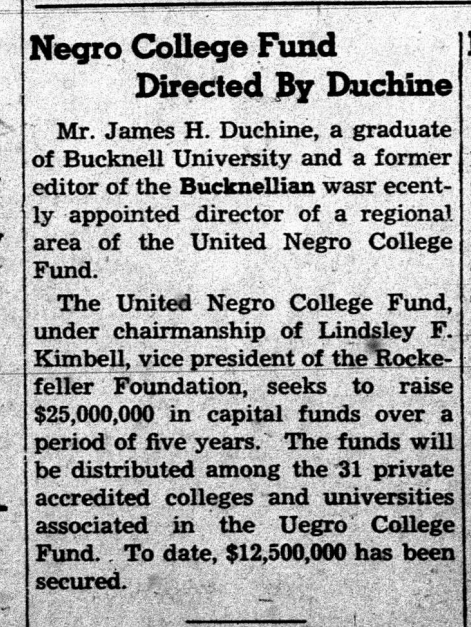
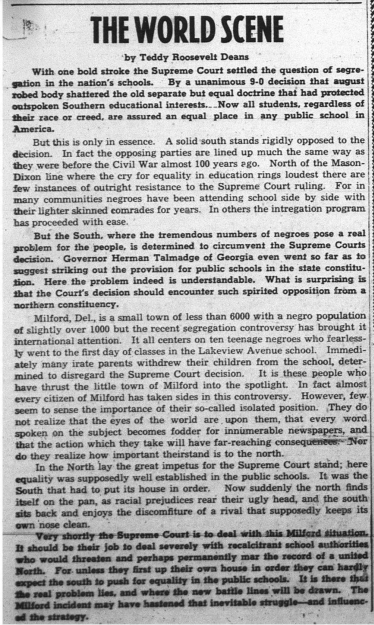
The World Scene: Segregation 1954 (Edit)
According to this October 1954 issue of the Bucknellian, the supreme court has settled the question of segregation in schools, but the article acknowledges that there is a great deal of opposition in the South. The author discusses examples of towns and schools who are attempting to circumvent the Supreme Court decision. Surprisingly, some schools in the north show as much rejection of the decision as most southern schools.
Conference Attendance
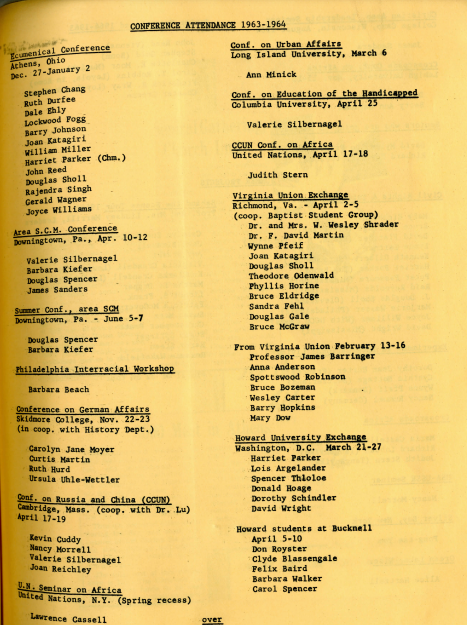
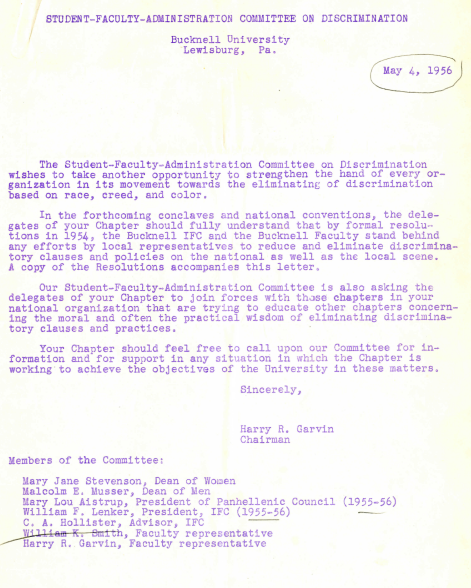
Student-Faculty-Administration Committee on Discrimination
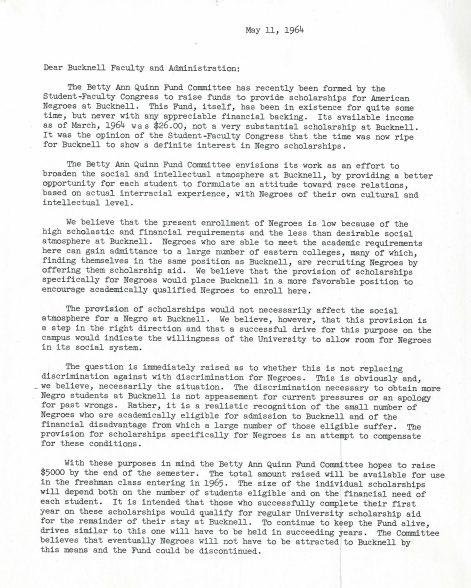
Scholarship Fund Committee Formed 1964
This official university correspondence from May 1964 describes the Betty Ann Quinn Fund Committee. This committee was created to reinvigorate the Betty Ann Quinn Scholarship, which was established to raise funds for scholarships for black students. The committee acknowledges the potential or reverse discrimination by creating a fund that encourages black students only, but they call such selection “necessary.” The group belittles the current total of the fund ($26) and hopes to raise $5,000 by the end of the semester.
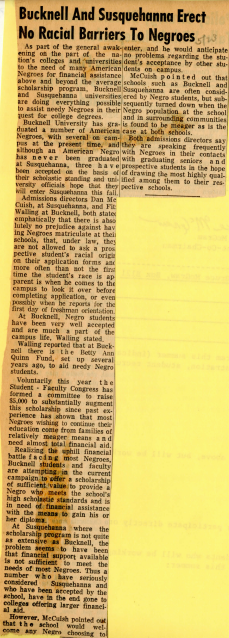
“Bucknell and Susquehanna Erect No Racial Barriers to Negroes”
This local news article from the 1960s applauds local schools, Bucknell and Susquehanna Universities, for making their campuses open to black applicants. The author makes it clear that Bucknell’s tactic is to offer funds for such prospective students while Susquehanna’s means are more scarce. Despite these efforts from the schools in question, black students are low in attendance and admission partially because neither campus/town has a very large black community already established there.
“Panel Discussion Reveals Ideas on Discrimination” 1961
This March 1961 Bucknellian article reports on the panel on discrimination (made up of administrators and faculty) that took place in the basement of the Phi Lambda Theta house. The event was a huge success as more students and faculty members attended than could fit in the room. The discussion included defining discrimination; elucidating examples of discrimination at Bucknell; questioning discrimination in the admissions process, in fraternities, etc.; and pondering how to alleviate some of the social pressures caused by the Greek system.
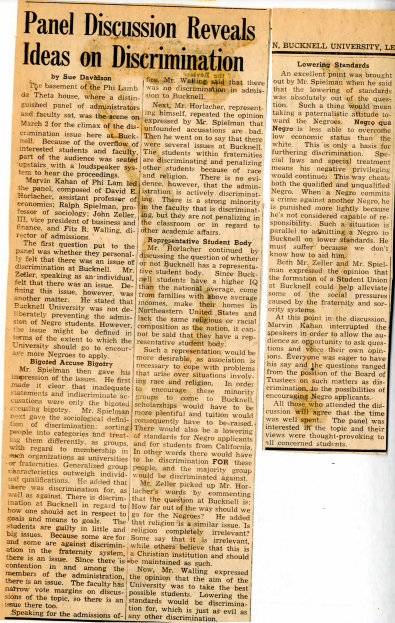
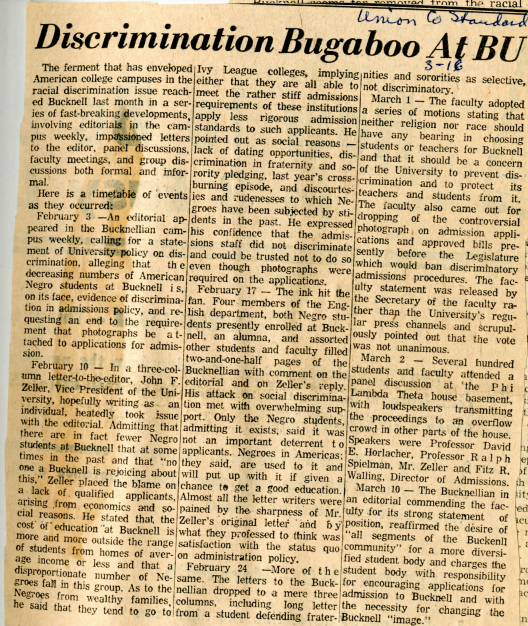
“Discrimination Bugaboo at BU”
“Discrimination in Athletics? -1961
This Bucknellian article from February 3, 1961, is the first of many such quandaries about discrimination as listed in Item #80. In particular, the author questions why Bucknell does not have any black student-athletes on campus, and they query that some policy in athletics or admissions is leading Buckell down “the wrong path.”
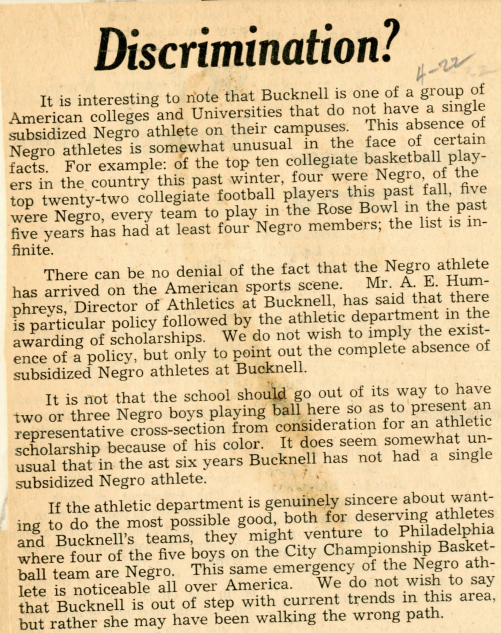

Bucknell Fund Seeks Money to Help Integration
This 1963 Bucknellian article announces the Betty Ann Quinn Scholarship Fund Committee’s initiative to raise $5,000 in order to provide numerous scholarships to black students seeking to attend Bucknell. The article also addresses criticism of the initiative in it possibly being a new form of discrimination due to it exclusively benefitting black students. In a refutation of that claim, the fund serves as a “realistic recognition of the disadvantage” that most Black people face, whether culturally, socially, or financially. The article also recognizes that the fund could be perceived as a simple appeal to morality in order to sway the student body toward efforts of racial equality. Instead, the fund serves as a means of providing better opportunities to black students, so as to better diversify the social and intellectual atmosphere on campus, in addition to providing Bucknell students with the opportunity to broaden their understanding of racial relations and formulate their own opinion on the matter. In many ways, the fund serves not only to benefit black students seeking educational opportunities at Bucknell but also to provide current Bucknell students with diverse perspectives through exposure to people outside of the school’s homogeneous student body.
Statement on Discrimination in Fraternities and Sororities
This official university statement from 1965 discusses Bucknell’s intolerance of discriminatory practices by sororities and fraternities. This communication comes in response to a statement released by the United States Office of Education that any institution with fraternities or sororities must ensure that those organizations abide by the requirements outlined in the Civil Rights Act for avoiding discriminatory practices. Because Bucknell receives federal grants, the institution must annually certify its compliance with the provisions of the Civil Rights Act.
While Bucknell’s intolerance of discrimination is noted as partially resulting from national legislative pressures, the administration does claim that discrimination of any kind is antithetical to the liberal spirit of the university, and has no place on campus. As such, the administration notes that all sororities and fraternities must submit statements certifying that they did not engage in discriminatory practices when making membership decisions in order to be officially recognized by the university for the following year. This communication demonstrates some of the national pressures exerted on Bucknell to comply with practices of equity and inclusivity.
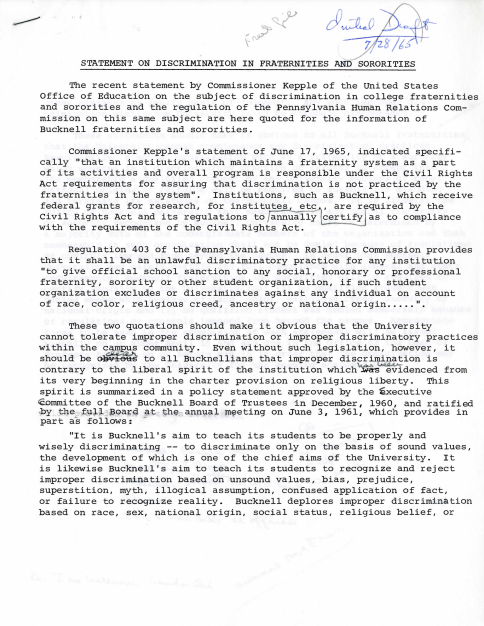
Statement on Discrimination in Fraternities and Sororities
This official university statement from 1965 discusses Bucknell’s intolerance of discriminatory practices by sororities and fraternities. This communication comes in response to a statement released by the United States Office of Education that any institution with fraternities or sororities must ensure that those organizations abide by the requirements outlined in the Civil Rights Act for avoiding discriminatory practices. Because Bucknell receives federal grants, the institution must annually certify its compliance with the provisions of the Civil Rights Act.
While Bucknell’s intolerance of discrimination is noted as partially resulting from national legislative pressures, the administration does claim that discrimination of any kind is antithetical to the liberal spirit of the university, and has no place on campus. As such, the administration notes that all sororities and fraternities must submit statements certifying that they did not engage in discriminatory practices when making membership decisions in order to be officially recognized by the university for the following year. This communication demonstrates some of the national pressures exerted on Bucknell to comply with practices of equity and inclusivity.
Memorandum re: Discrimination
In this September 1968 university correspondence between President Charles Watts and Dean John Dunlop, President Watts discusses bringing the issue of racial and religious discrimination in fraternities to the Executive Committee of the Board at one of its next meetings. This correspondence is in response to a memo sent by Dunlop in July where he outlined certain concerns about discriminatory practices occurring in fraternities.
Toward the end of his message, Watts also suggests that they detail the potential discrimination occurring in sororities, thereby holding both types of organizations to a similar standard. While Watts notes that the Pennsylvania Human Relations Commission might not officially track and record Bucknell’s progress with discrimination, he shares concerns that someone eventually will and Bucknell will need to be prepared to move forward in a positive direction.
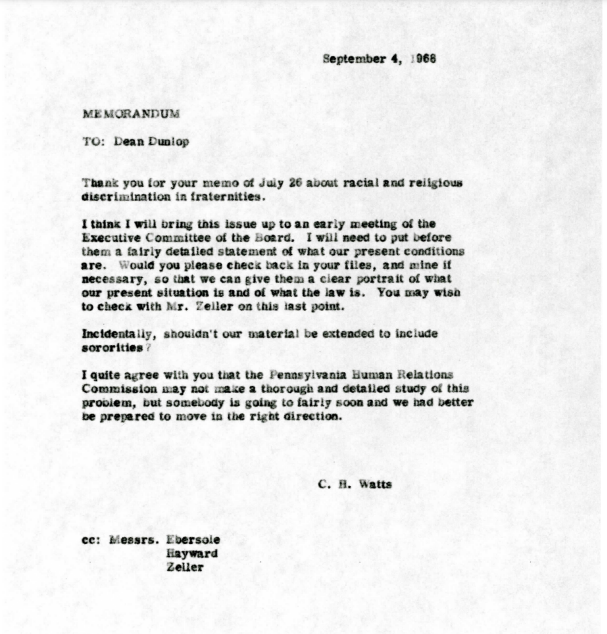
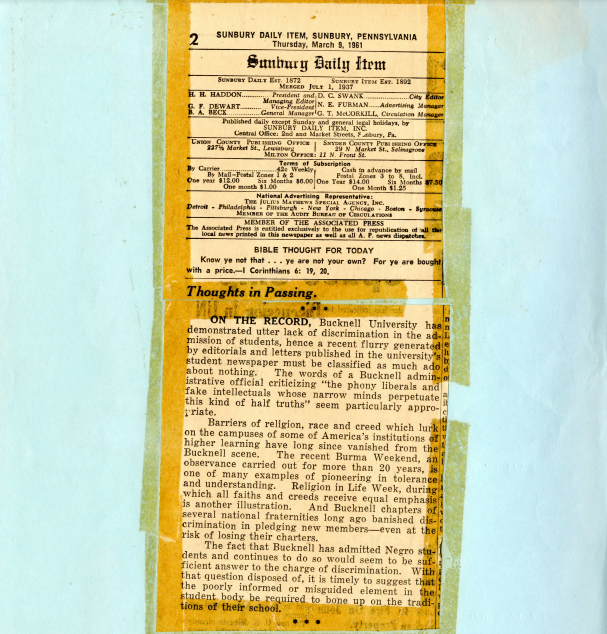
“Clean Bill Given To Bucknell On Racial Question”
These two 1961 articles from the Sunbury Daily Item discuss the controversy of discrimination at Bucknell as expressed by Bucknellian editorials, as well as the response from Bucknell’s administration. Primarily, the question of discrimination arises from criticism of Bucknell’s admissions policies, especially in its requirement for an identifying photograph. Instead, and in response to the lower number of black student enrollments, the Vice President of the university cites economic reasons as the main reason for the lack of black student representation. Because Bucknell’s costs continue to rise, many students from lower or average-income homes are priced out of being able to attend the university. While the VP denies this economic challenge as discriminatory, it does prompt further discussion regarding the role that a university’s costs play in generating a less diverse student body if lower/average-income students are priced out of attending. The articles also cite other social concerns leading to lower black student enrollment, such as discrimination from sororities and fraternities, and racist encounters with the larger Lewisburg community at large. While Bucknell’s administration provides a response to such concerns through initiatives that prevent acts of discrimination, there seems to be a discrepancy between the lived experiences described by black students and the responses provided by university officials that deny any form of discrimination occurring on Bucknell’s campus.
Replace side image with long newspaper after downloading and converting
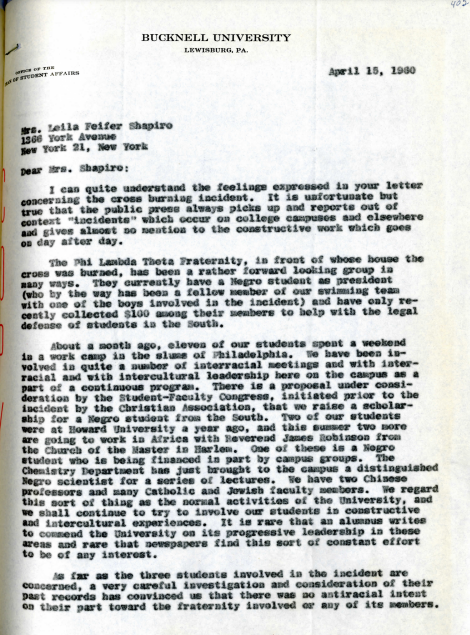
Excuses Made for Burning Cross: “Letter to Alumnus re: Interracial Contributions”
This 1960 official university correspondence documents the response from Dean John C. Hayward to an alumnus who expressed concern about a cross-burning incident that took place outside a Bucknell fraternity. Though Hayward does condemn the action of those involved in the incident, he notes that, despite the cross-burning incident, the fraternity it took place in front of is a “forward-looking group” and that the investigation into the incident proves that there was no racial intent in the act itself. Continuing, the document discusses some of the university’s initiatives to diversify student experiences and promote “interracial and intercultural contributions” to the campus. Notably, Hayward discusses Phi Lambda Theta’s election of a black president, the Howard University Exchange Program, the on-campus presence of a black scientist for a series of Chemistry lectures, and a proposal under consideration to provide a scholarship to a black student from the south.
African American Speakers at Bucknell
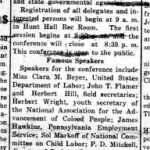
NAACP Conference on Migrant Labor Issues
The Bucknell chapter of the NAACP (National Association for the Advancement of Colored People) sponsored a one-day conference to raise awareness of the working conditions of those engaged in migratory labor. This Bucknellian article lists several prominent speakers who participated in the conference along with the schedule of events and topics to be discussed.
Jane E. Hunter, Founder of Phillis Wheatley Association —1948
Jane E. Hunter, the founder and director of the Phillis Wheatley Association (for black girls) in Cleveland gave a lecture in March 1948. The Phillis Wheatley Association is meant to strengthen and empower individuals and families to succeed and build a thriving community free from poverty by creating hope, opportunity, and action. Hunter came to Bucknell to lecture in a class and lead the Student Church forum. Her topics included “My Faith in God and Humanity” and “Strengthening Democracy”.
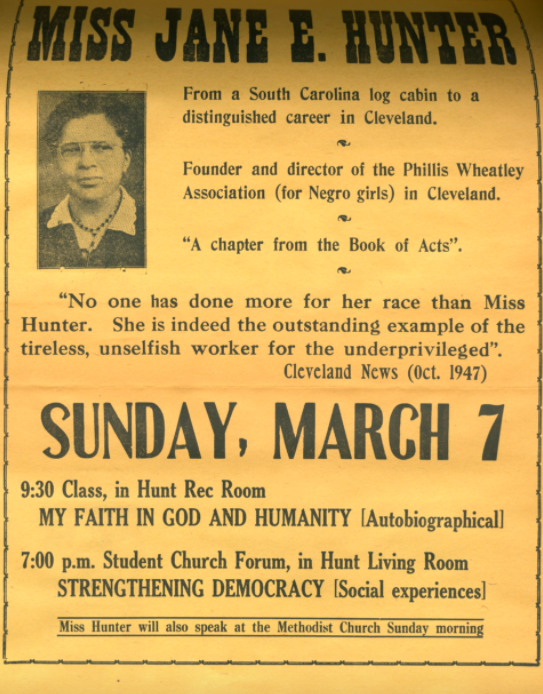
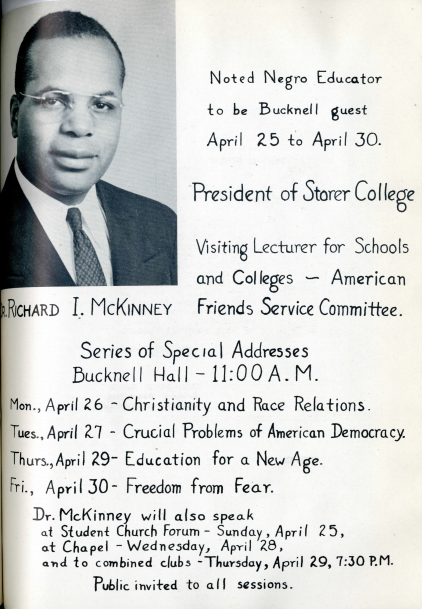
Richard McKinney —1948
Richard McKinney was the first black President of Storer College, a Historically Black College, founded in 1865 in West Virginia. He served as president of the college from 1944-1950. In 1948, Richard McKinney visited Bucknell to give a series of addresses on various topics such as education inequality, crucial problems of American democracy, ideas of freedom and fear, and race relations.
Jackie Robinson —1949
Jack “Jackie” Roosevelt Robinson, was a legendary Brooklyn Dodgers baseball player and the first African American to play in the Major League. In February of 1949, Jackie Robinson, known to stir the pot and break the color line, visited campus. It was an event sponsored by the University’s Christian Association, the B-Club, and the National Association for the Advancement of Colored People. The Student Church invited Robinson to give a talk on “My Story in Baseball” and these photographs include pictures of the famed “42” and his family with Bucknell students and faculty at the service.
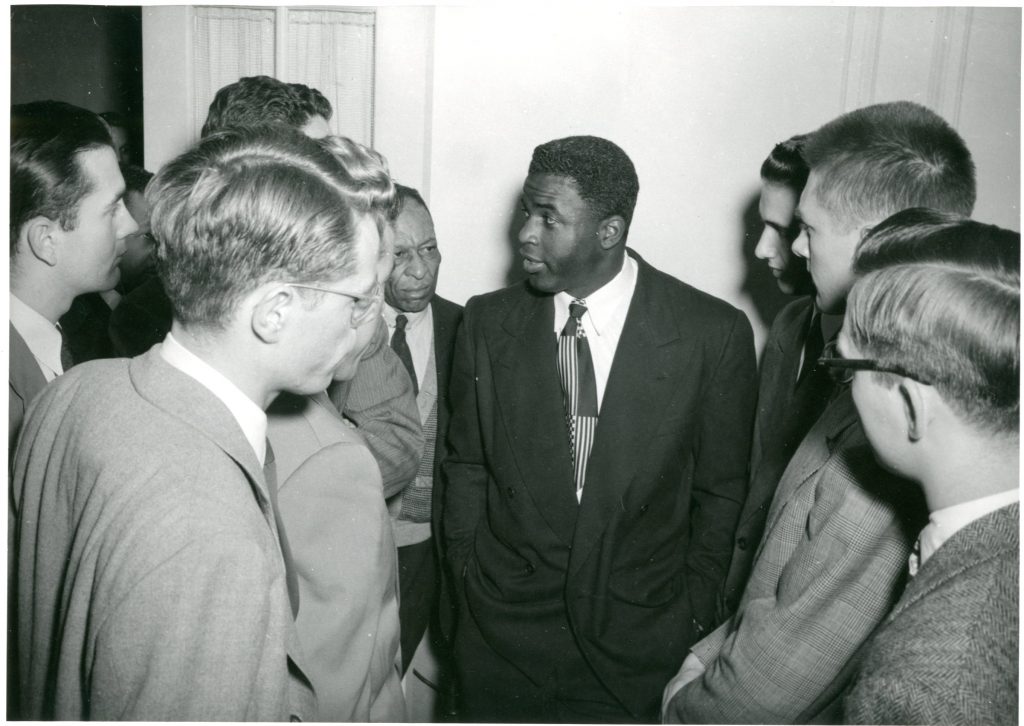
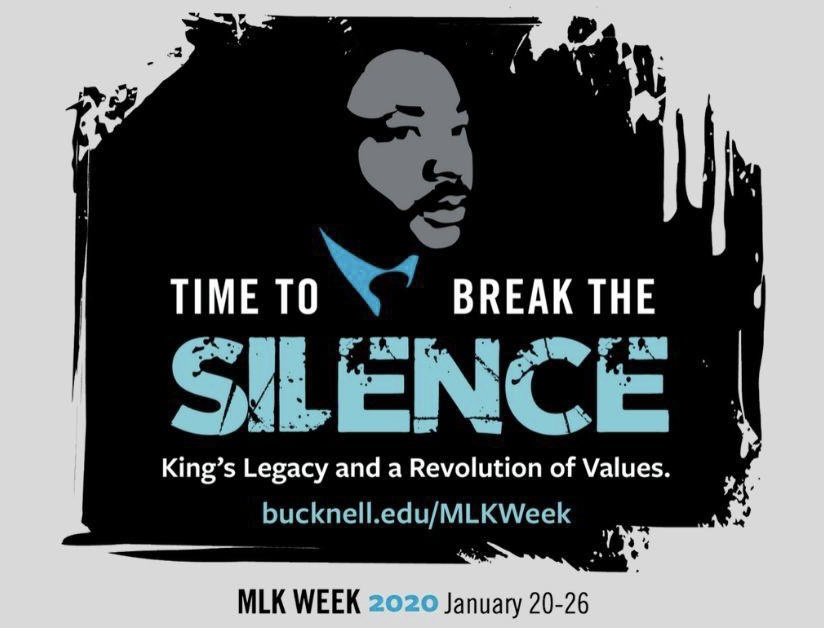
Dr. Martin Luther King Jr.- 1958
In May 1958, Dr. Martin Luther King Jr. spoke in Rooke Chapel and gave a lecture titled, “The Three Dimensions of a Complete Life.” In King’s opinion, the three dimensions of life are its length and our forthcoming moral self-interestedness, its width and “the extension of life to others” through altruism, and its height in relation to belief and loving God. He claimed the ultimate importance of love and our ability to allow “every life to have this sky” of freedom and potential.
Friends Society Sponsors Freedom Riders Lecture —1961
Freedom Riders were civil rights activists who rode on interstate buses into the segregated southern United States to challenge the non-enforcement of the United States Supreme Court decisions in Morgan v. Virginia (1946) and Boynton v. Virginia (1960), which ruled that segregated public buses were unconstitutional. Many southern states had ignored these rulings and the federal government would not enforce them. The first Freedom Rider left in 1961. Two Freedom Riders (who spent 40 days in jail for challenging segregation norms in the South) and the Washington president of the Congress of Racial Equality (CORE) came to Bucknell to give a speech sponsored by the Friends Society. These three speakers addressed how vital civil disobedience is in creating change and “The Principle of Non-Violence in the CORE program.”
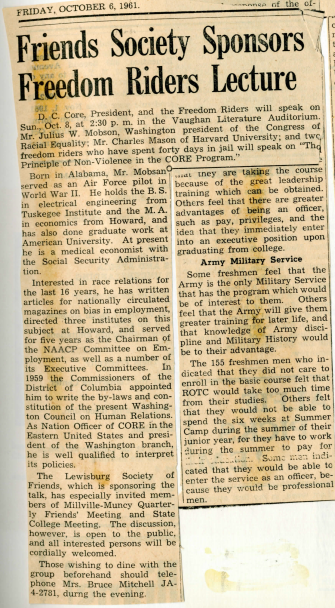
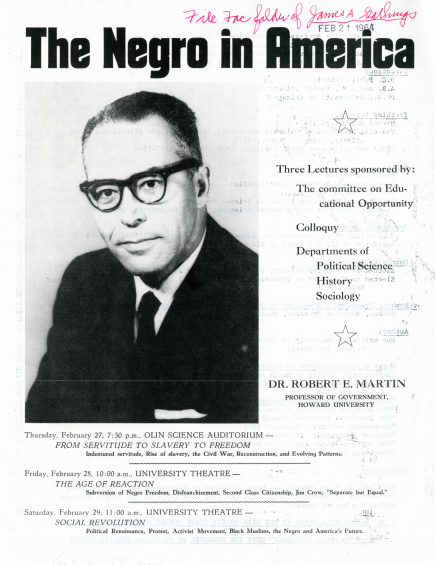
Dr. Robert E. Martin- 1964
In February 1964, the Committee on Educational Opportunity sponsored a series of lectures on the black experience in America. This was led by Dr. Robert E. Martin, a Howard University professor. The historically black university was founded in 1867 in Washington D.C.
James Farmer- 1965
James Farmer, a national director of the Congress of Racial Equality (CORE) and one of the first freedom riders, visited the university in 1965 to give a lecture titled, The Civil Rights Revolution where he emphasizes non-violence tactics. In the image, Farmer is having a conversation with Bucknell students in Hunt Hall following his lecture that took place in Davis Gym.
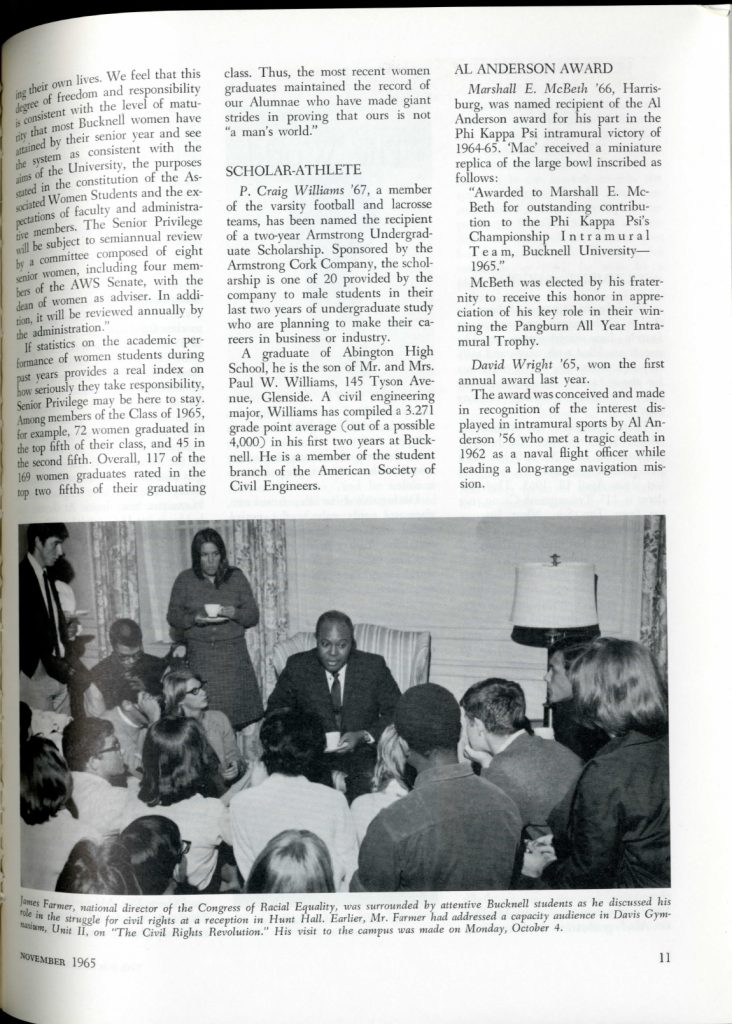
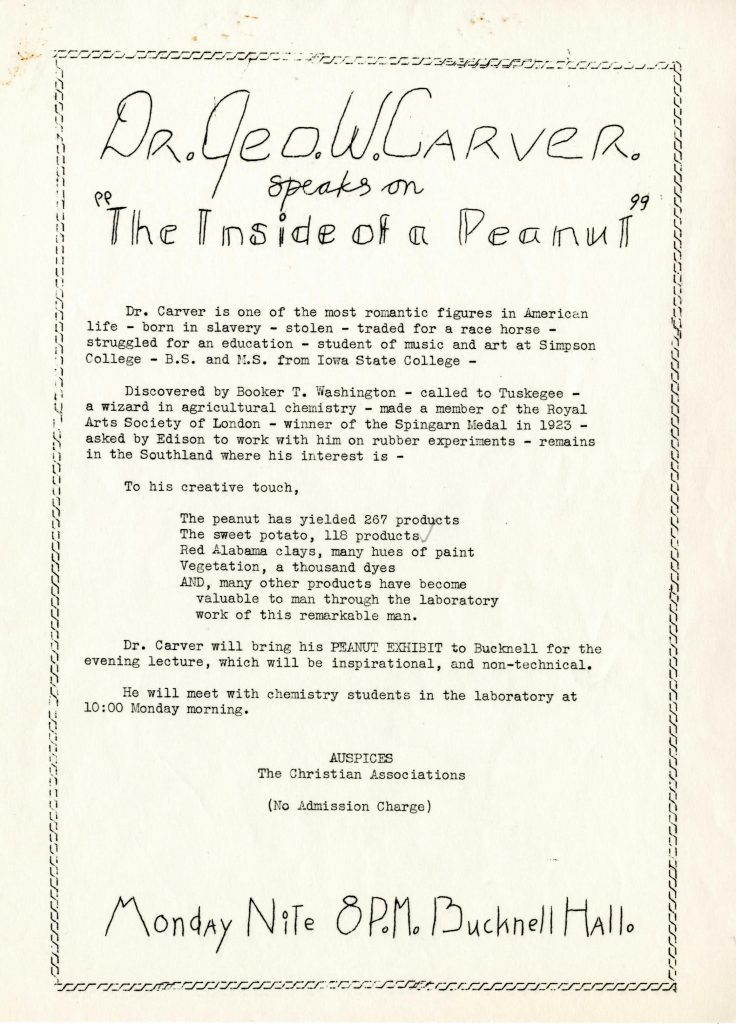
Dr. George Washington Carver
George Washington Carver gave an inspirational lecture on “The Inside of a Peanut” and brought his peanut exhibit to Bucknell. Carver was an American agricultural scientist and inventor. He actively promoted alternative crops to cotton and methods to prevent soil depletion and was the most prominent black scientist of the early 20th century. During his visit to Bucknell, he also met with chemistry students in their lab earlier that morning. The flyer included his greatest accomplishments and life story.
Frank T. Simpson: Discrimination Caused By Economics Says Simpson at Soc Club Meeting
The author of this Bucknellian article from 1947 speaks about Frank T. Simpson’s (1907-1974) (the executive secretary of the Connecticut Inter-Racial Commission) visit to Bucknell. After guest lecturing in many classes and NAACP (National Association for the Advancement of Colored People) meetings on campus and across the nation, Simpson visited and spoke to the Sociology Club at Bucknell about how discrimination and economics are related.
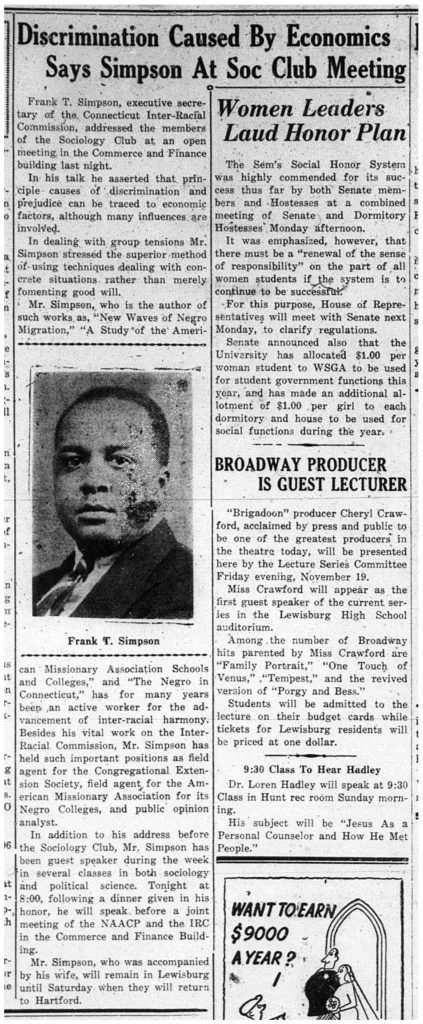
Another Viewpoint
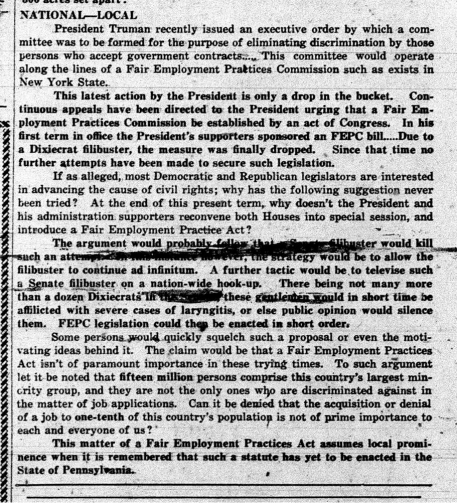
Another Viewpoint Article – December 1951: President Truman
This Bucknellian newsletter article discusses the national event of President Truman (1884-1972) (US President from 1945-1953) seeking to eliminate discrimination through the use of an executive order. The article also advocates for the Fair Employment Practices Commission. The commission’s overall mission: securing anti-discriminatory legislation in the future.
Another Viewpoint —January 1952 Issue: Southern Racism
In January 1952, a Bucknellian article discussed an incident in Florida where a Sheriff killed two black prisoners he was supposed to be escorting. The Columnist argued that this was not an isolated incident, as vandalism towards black religious establishments and residences is out of control as well. Ultimately, the author likens these attacks to the terrorist tactics of the nazis.
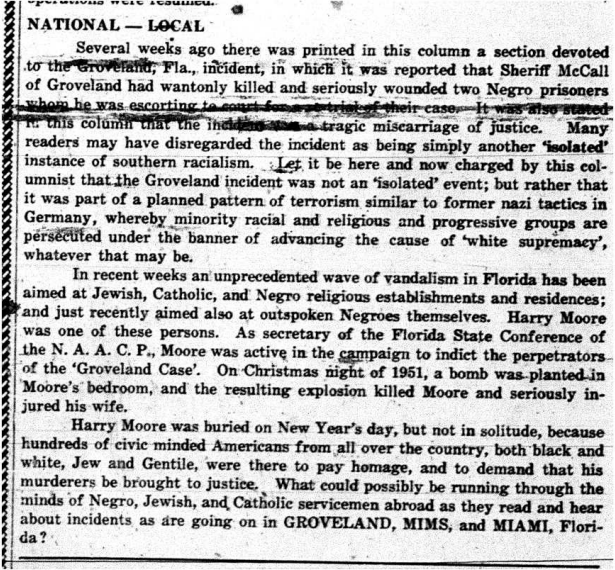
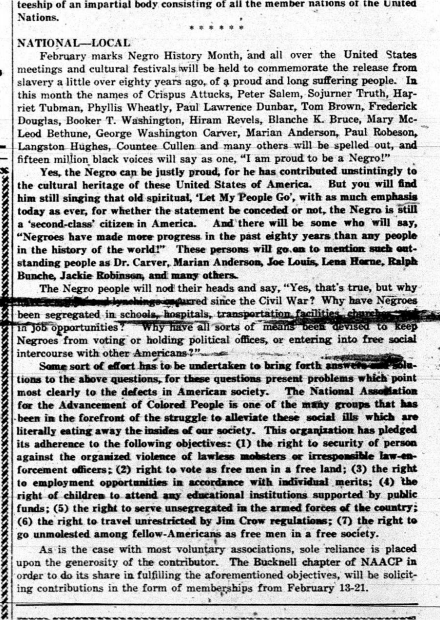
Another Viewpoint —February 1952 Issue: Black History Month
In February 1952, the Bucknellian shared the contributions of black historical figures to the cultural heritage of the U.S. It asked why segregation and discrimination persist 80 years after slavery has ended. The author pushed for contributions, in the form of membership, to the Bucknell NAACP chapter (National Association for the Advancement of Colored People) in order to start healing the “defects of American society” that encourage the continuance of this unfair treatment.
Another Viewpoint -June 1961: Bucknell’s Official Policy on Discrimination
In June 1961, Bucknell made a statement on discrimination. It remarks that no discrimination based on religion, sex, gender, race, or national origin at Bucknell will be tolerated. It declares that Bucknell’s doors “have been open and shall remain open to students, to faculty, and to staff members of every race and of every nationality.”
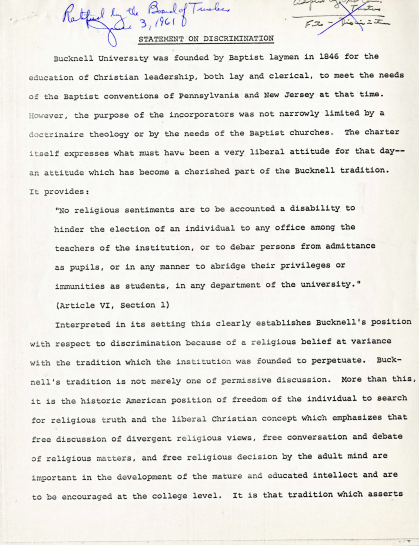
Bucknellian Collection
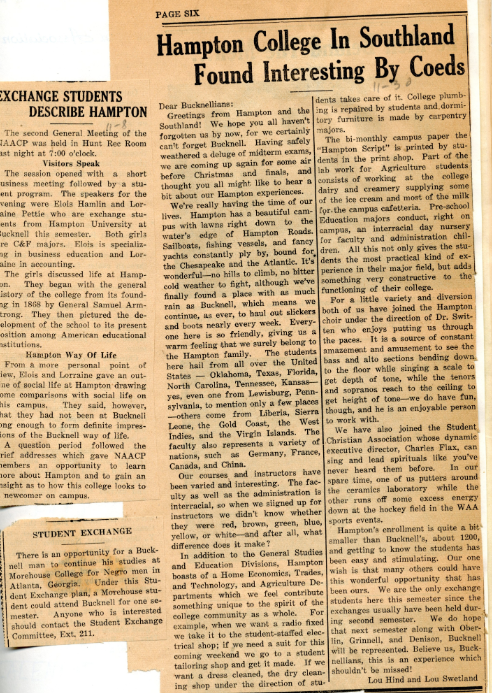
Hampton Student Exchange
In this November 1951 issue of the Bucknellian, two Bucknell students report their experiences at Hampton College, where they spend a semester due to an exchange program. Hampton College is a historically black college that was founded in 1864 in Southland, Arkansas. The students say that they fully enjoyed their experience at Hampton. This item also advertises the lecture on the exchange experience, which is to be led by the two female Hampton students who stayed at Bucknell. Furthermore, an ad is posted looking for a Bucknell man who would go to Morehouse College, established in 1867 for Negro Men in Atlanta, GA, during the next exchange.
NAACP Confers to Fight Discrimination, Prejudice
This Bucknellian article from 1949 or 1950 states that the PA State Conference of NAACP (National Association for the Advancement of Colored People) Youth Councils and College Chapters will be held at Bucknell. The conference seeks to create a youth organization to fight discrimination and prejudice in the state of Pennsylvania. The article gives a breakdown of the conference schedule as well.
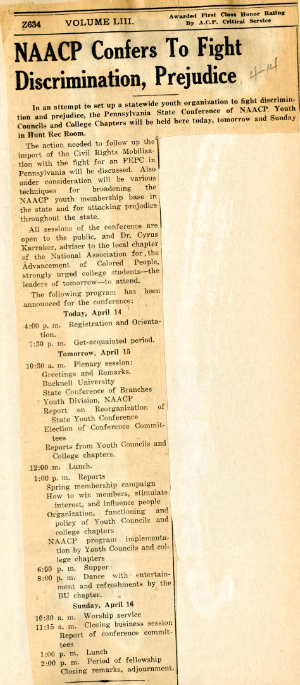
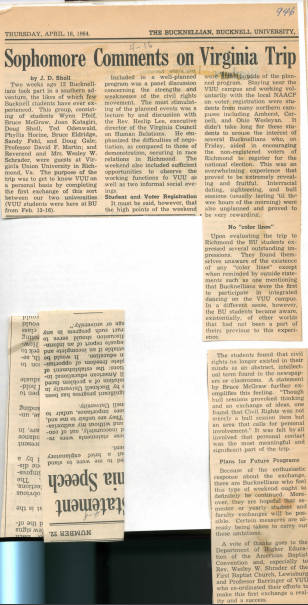
Sophomore Comments on Virginia Trip
This Bucknellian article from April 1964 shares the experiences of twelve Bucknell Students who visited Virginia Union University. VUU is a historically black educational institution that was founded in 1865 in Richmond, VA.; Bucknell worked with VUU as a part of a new exchange program. Students joined panel discussions, attended lectures, and frequented social events. Students also assisted the NAACP (National Association for the Advancement of Colored People) with voter registration for the upcoming presidential election. Overall, students reflect positively on the experience and seek to plan future programs.
Students Register Voters in Virginia
These articles from the Bucknellian and the Sunbury Daily Item from April 1965 praise campus activism. The activism in question is that, for the second year in a row, 13 Bucknell students spent their spring breaks registering voters with the YWCA. These articles detail the students’ experiences with canvassing, contacting over 2,000 people in all.
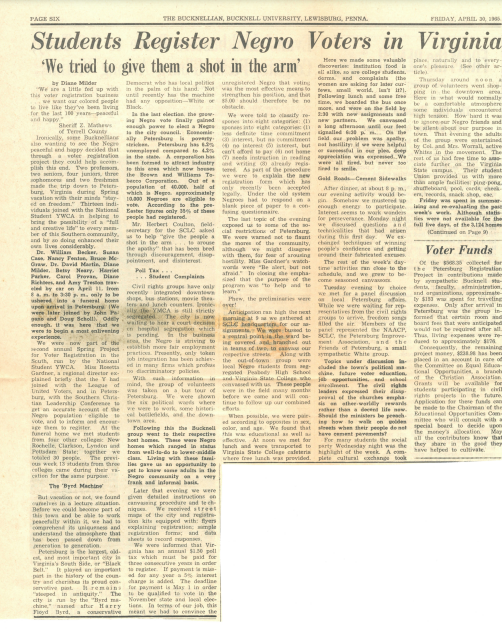
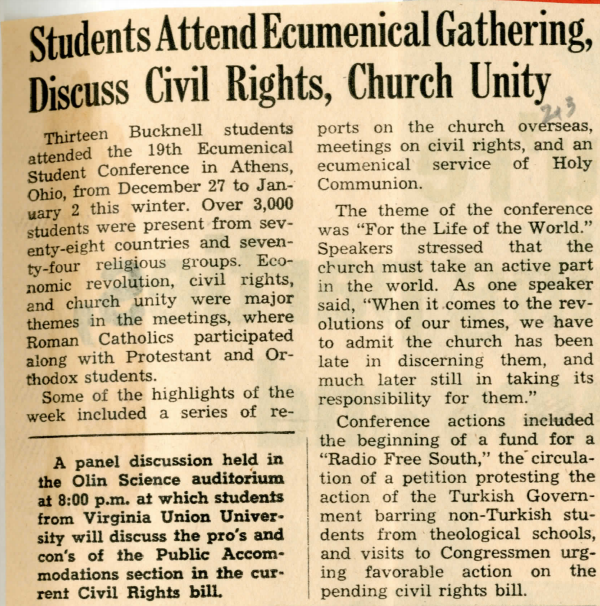
Students Attend Ecumenical Gatherings, Discuss Civil Rights, and Church Unity
This article from the Bucknellian in 1963 shares the experiences of thirteen Bucknell students attending the Ecumenical Student Conference in Athens, Ohio. They attended the conference over winter break to discuss the church’s responsibility for the revolution. The theme of this year’s conference was “For the Life of the World,” and participants engaged mainly in worship and civil rights action planning.
A Time to Respond
This Bucknellian editorial from 1964 urges students to participate in the Civil Rights Movement, informing them of upcoming opportunities in which they should get involved. For example, the University will be providing transportation to Washington where a delegation of students will help lobby for the Civil Rights Act during the “March on Washington.” Additionally, students on campus are encouraged to help change “the social atmosphere at Bucknell” to be more welcoming and inclusive.
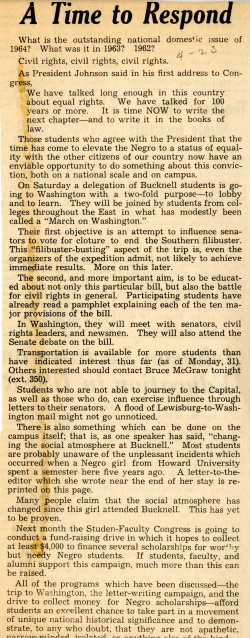
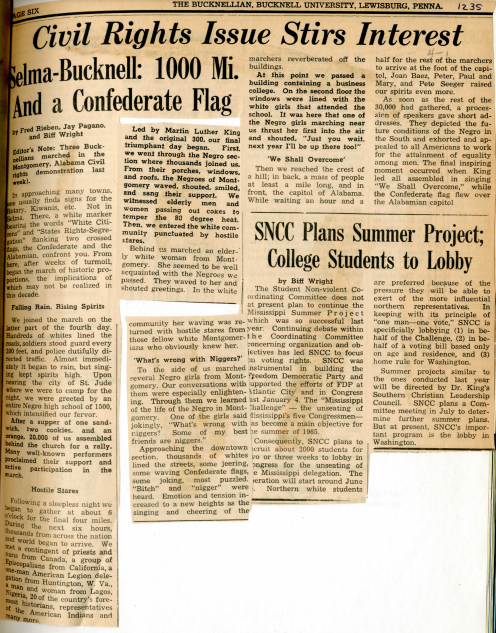
Civil Rights Issue Stirs Interest
This item contains two articles from the Bucknellian from 1965 or 1966. One article describes the incredible, resonant experience of three Bucknell students who marched in the Montgomery, Alabama Civil rights demonstrations. The other article discusses the Student Nonviolent Coordinating Committee (SNCC) and its summer project, including the upcoming lobbying project.
Revolution Steamrolling Uphill
This editorial from a 1965 or 1966 issue of the Bucknellian discusses the history of Black America, acknowledging that blacks have not been considered to be “American,” but now that is changing. The writer urges everyone to accept the citizenship of blacks, as the revolution is steamrolling and no one can stop it.
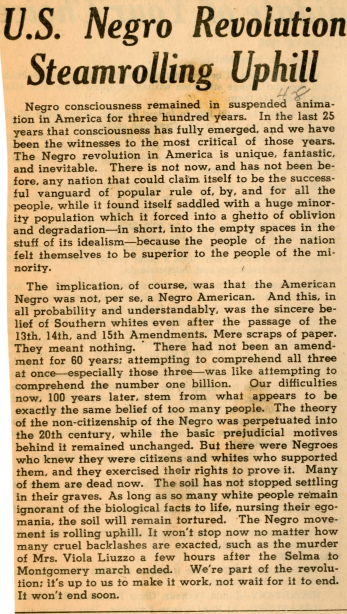
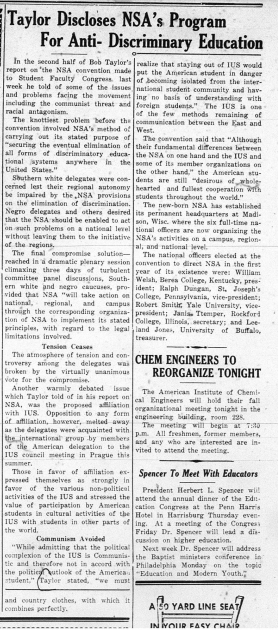
Taylor Discloses NSA’s Program For Anti-Discriminatory Education
In this article from a 1948 Bucknellian, the author reports on the NSA’s (National Security Agency) compromise with a new program. The new program involved cooperation to decide on specifics as the communist threat and racial antagonism made it difficult to come to a solution. Ultimately, the author admits that it is lawmakers, state officials, and older people (not students) who remain the problem because at least students “are still desirous of whole-hearted and fullest cooperation with students throughout the world.”
Howard Choir Will Present Concert in Davis Gym Friday
This Bucknellian article from 1947 details the program of the Howard University choir’s performance the next day. Howard University is D.C.’s historically black college, and it was founded in 1867. This is the choir’s first performance at Bucknell, and many more will follow. At the end of the article, the author informs that the event is hosted by Bucknell’s chapter of the NAACP, and proceeds from the concert will go towards the $1000 goal for the Betty Ann Quinn Scholarship Fund.
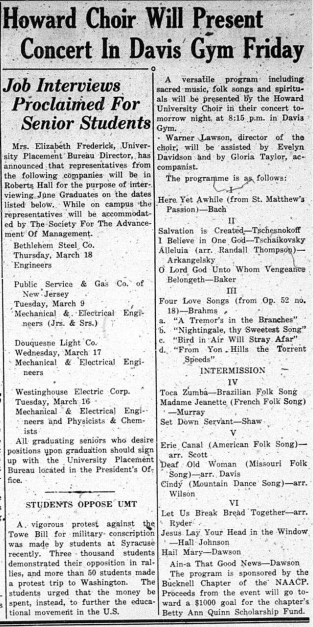
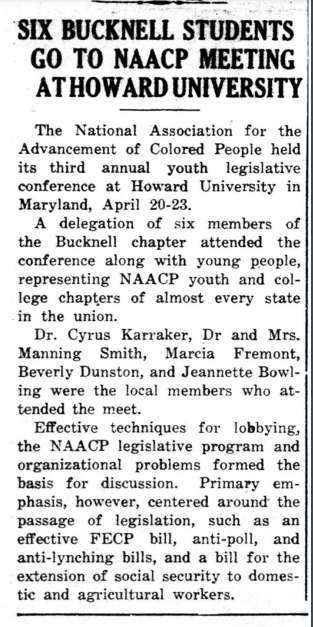
BU To Entertain Inter-Collegiate NAACP Discussion Group At Cowan
This Bucknellian article from October 1948 shares that NAACP’s first Inter-Collegiate conference will be held at Bucknell’s Cowan House to hold discussions and plan regional coordination of the chapters. Seven colleges are set to attend, and Ruby Hurley (1909-1980), national youth secretary of NAACP, will be the guest speaker.
“Six Bucknell Students Go to NAACP Meeting at Howard University”
This April 1949 Bucknellian article shares how six Bucknell NAACP members (National Association for the Advancement of Colored People) and a small selection of Lewisburg community members attended the third annual youth legislative conference at D.C.’s historically black Howard University (founded in 1867). There, they discussed the passage of legislation, effective lobbying techniques, and organizational problems.
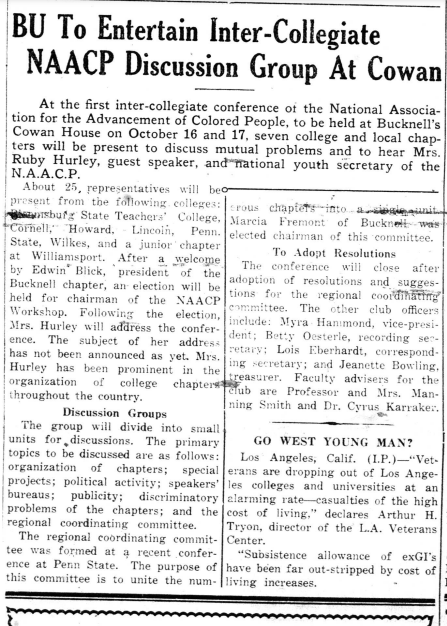
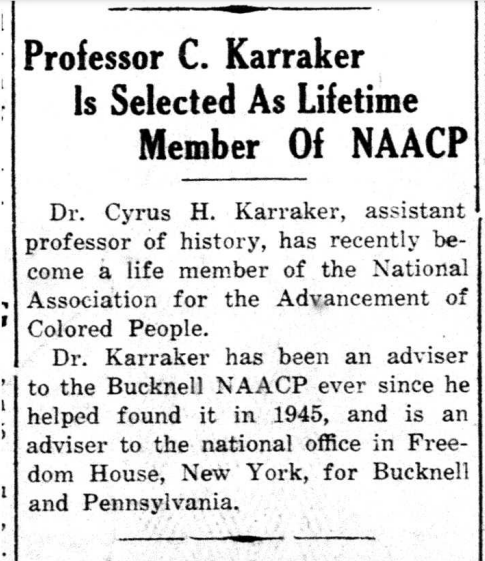
Professor C. Karraker Is Selected As a Lifetime Member of the NAACP
This Bucknellian article from May 1949 announces Bucknell History Professor Cyrus Karraker’s (1896-1966) award of a lifetime membership in the NAACP (National Association for the Advancement of Colored People). Dr. Karraker helped found the Bucknell NAACP in 1945 and has advised it ever since. The entire university and the article’s author applaud his achievement.
Susquehanna Valley Group Plans Brotherhood Week
This Bucknellian article from February 1951 shares information about the upcoming Brotherhood Week at Bucknell. Sponsored by the National Conference of Christians and Jews, Brotherhood Week seeks to promote understanding and cooperation among those of all religions and “eliminate inter-group prejudices.” It consists of a forum that will feature speakers of various faiths and backgrounds.
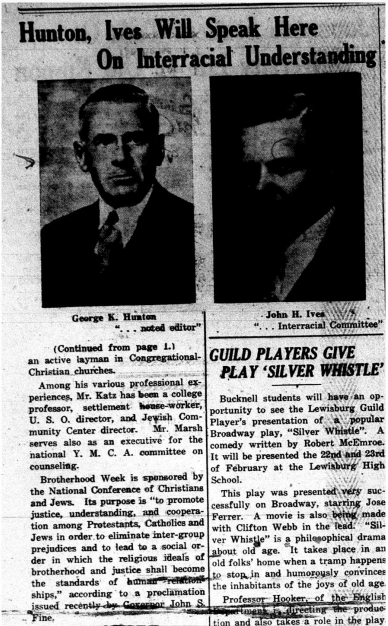
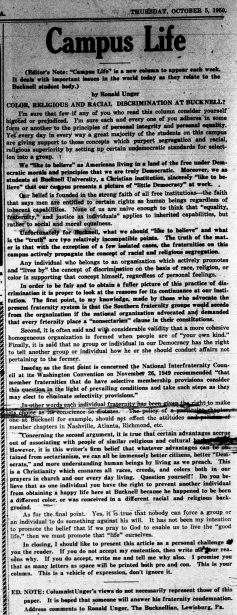
Campus Life
This editorial from an October 1950 issue of the Bucknellian stresses the difference between what Bucknell students would like to believe about their views on race and prejudice and the reality of their actions. The author argues that discrimination continues at Bucknell, particularly in fraternities. He asserts that the fraternities “actively propagate the concept of racial and religious segregation” and that anyone belonging to them supports that concept as well. In closing, the columnist asserts that, for us to be truly Christian, none of this unfair treatment can remain.
Howard University Players Will Be Here December 9 Sponsored By The NAACP
This October 1950 Bucknellian article publishes the campus NAACP’s (National Association for the Advancement of Colored People) plan to sponsor players from Howard University to perform at Bucknell again on December 9th. Howard is a historically black college in D.C. that was founded in 1867.
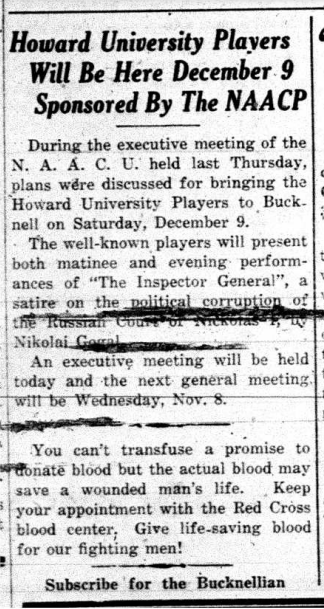
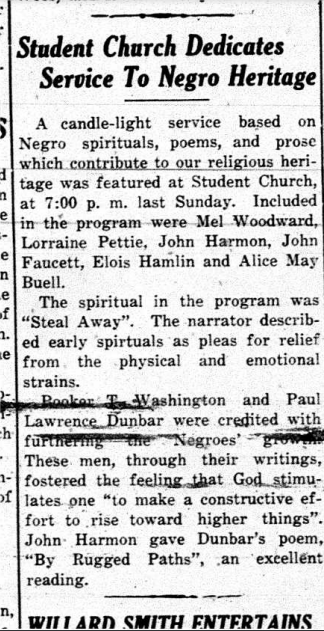
Student Church Dedicates Service to Negro Heritage
This Bucknellian article from October 1951 shares how Bucknell’s student church featured a candlelight service based on black spirituals, poems, and prose which “contribute to our religious heritage.” The spiritual “Steal Away” was central, and the speakers relied most on the opinions of Booker T. Washington (1856-1915) and Paul Lawrence Dunbar (1872-1906) in accordance with the narrative that all people must strive to higher ambitions and paths through God.
A Clarification
In this March 1961 edition, the Bucknellian clarifies its stance on discrimination in this article. This official statement on discrimination also includes a response to the official statement and the original February 3, 1961 editorial. The author highlights the problem of discrimination at the university, claiming that “the question is not one of the clauses, but one of attitude.” The author also admits the ways in which previous articles and editorials on the concept have been misinformed and corrects the faults by referencing recently-released administrative studies.
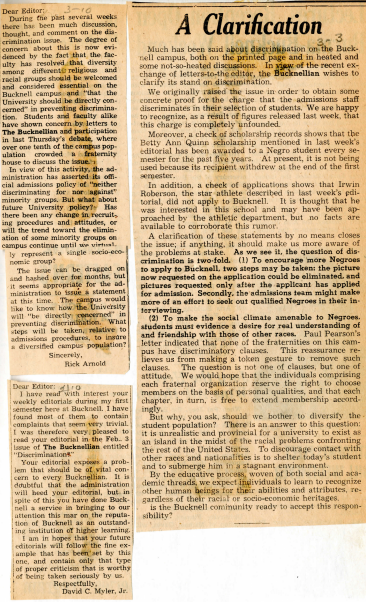

Faculty Takes Stand Against Discrimination
In this artifact, a Bucknell faculty member shares their stance on discrimination. In March 1961 a letter to the editor of the Bucknellian was sent from Dr. C. Willard Smith (1899-1979). He was a Professor of English at Bucknell from 1925-1969 and secretary of the faculty. In this letter, he details a resolution adopted by the Bucknell faculty regarding discrimination. Their stance isn’t unanimous, but a majority move to adopt the university’s policy against religious and racial discrimination.
Eliminate this Discrimination
This Bucknellian article from March 1961 explains the steps the world (and campus) should take to overcome discrimination. Mainly, the author urges readers to understand that change must be gradual or the motivations for change won’t be genuine. The article also examines the way discrimination appears at Bucknell, which seems to be subtle and atmospheric rather than blatant and pinpointed. While the author is sick of hearing the word “discrimination,” they believe that the movement for equality in the world and on campus has to start with unified action.
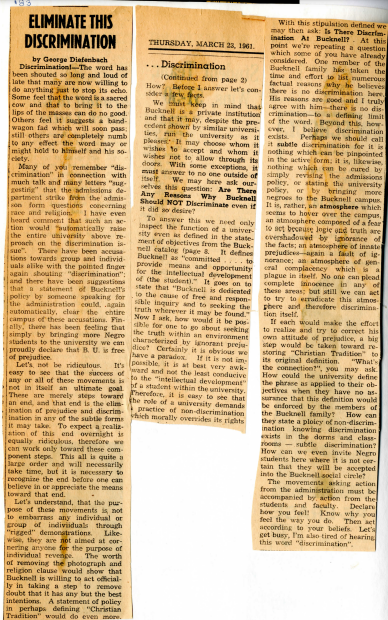
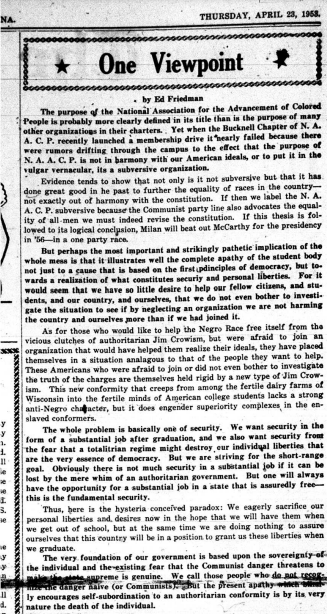
One Viewpoint: NAACP Subversive?
This Bucknellian article from April 1952 claims that Bucknell’s NAACP’s membership drive nearly failed because of rumors that the NAACP is a subversive organization with undertones of communism. The author of the column addresses this backlash and argues that this is not the case and encourages readers and fellow students away from authoritarian conformity.
Seven Attend NAACP Conference; Hear Eisenhower and Bunche Speak
This news clipping from the Bucknellian in April of 1954 discusses the NAACP’s (National Association for the Advancement of Colored People) spring conference of that year. Seven Bucknellians attended the Freedom Fulfillment Conference in Washington DC, the goal of which was the initiate a 10-year program for complete freedom and equality for all minority groups by 1963. Speakers such as President Eisenhower (1890-1969) (US President from 1953-1961) presented and the Howard University choir performed. Bucknell’s delegates represented one of only 2 schools notably present at the conference (the other being Harvard).
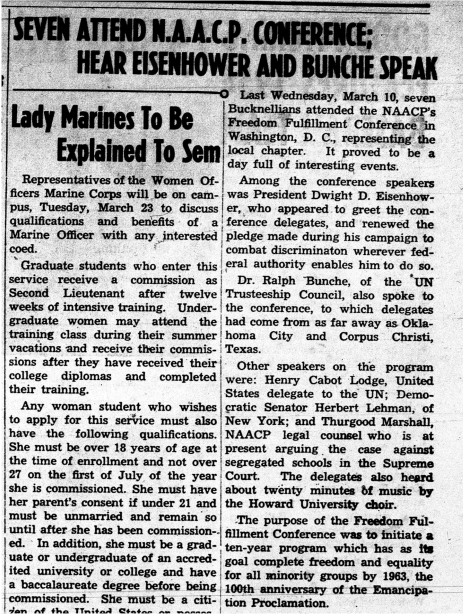
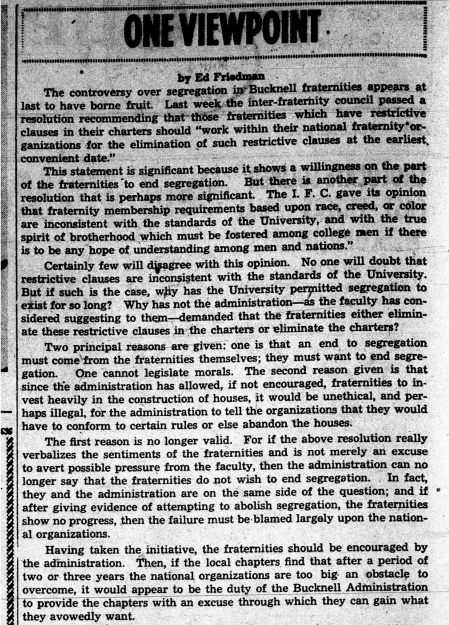
One Viewpoint: Fraternities
This column from the March 1954 issue of the Bucknellian addressed segregation within fraternities. It discusses the new Interfraternity Council resolution that encourages the end of segregation in fraternities. IFC asserts that such segregation goes against the ideas of brotherhood and the standards of the University. The author discusses why this has taken so long and what may happen next, hoping to see faculty support and the fraternities’ discriminatory clauses abolished in good time.
Evolution, Not Revolution
The author of this April 1954 Bucknellian article describes the ineffectiveness of compelling fraternities to repeal their discriminatory clauses. He maintains that change will have to be gradual rather than “revolutionary” because the ultimate decision “must come via the national fraternities.”
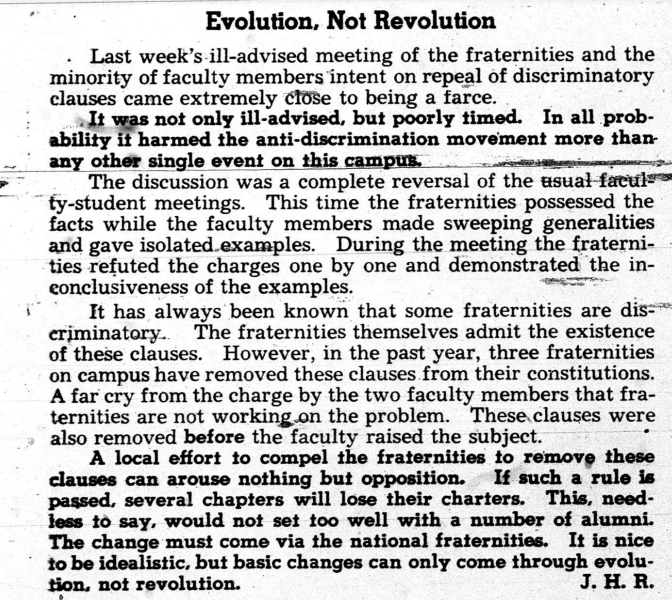
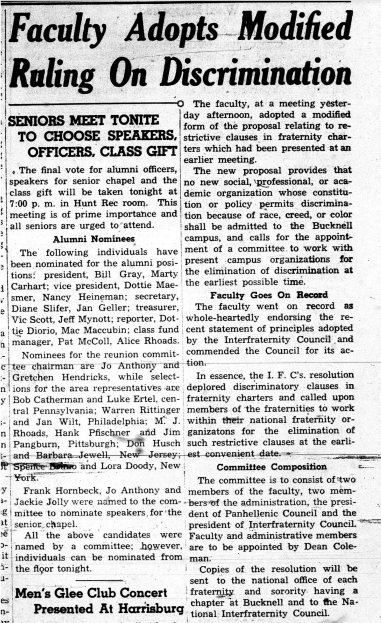
Faculty Adopts Modified Ruling on Discrimination”
In this article from the Bucknellian in April 1954, the faculty goes on record endorsing a new proposal declaring that no new social, professional, or academic organization whose constitution or policy permits discrimination because of race, creed, or color can be admitted to campus. The article outlines this new proposal and shares details about the committee that’s to be formed to uphold the proposal.
Bucknell NAACP Chapter to Hold Panel Discussion
This April 1954 Bucknellian article introduces an upcoming panel in Williamsport. The NAACP (National Association for the Advancement of Colored People), in conjunction with Rabbi Ephraim Einhorn (on the pulpit in Williamsport, PA from November 1952 until October 1954) of the Temple Beth Ha-Sholom, will hold a panel called “Students Look at Prejudice.” Students participating in the panel will represent a variety of races, religions, and points of view. They will speak about personal experience with discrimination and segregation in order to address the Rabbi’s growing concerns about “intergroup relations in all areas.”
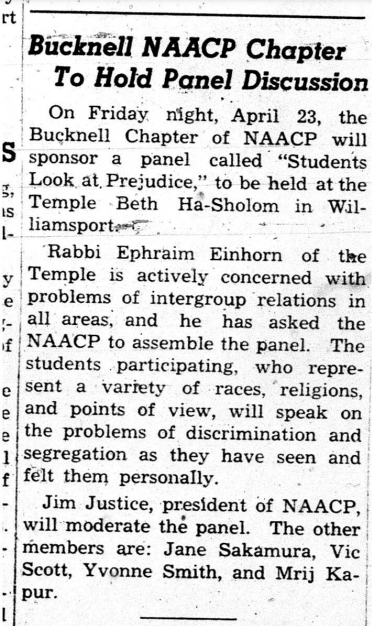
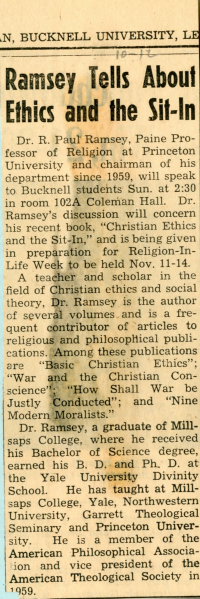
Ramsey Tells About Ethics and the Sit-In”
This article in the Bucknellian from October 1960 shares that Princeton religion professor and department chairman Dr. R. Paul Ramsey (1913-1988) will visit Bucknell to discuss his recent book Christian Ethics and the Sit-In. This event is a precursor to Religion-In-Life Week held the following month.
Discrimination in Lewisburg
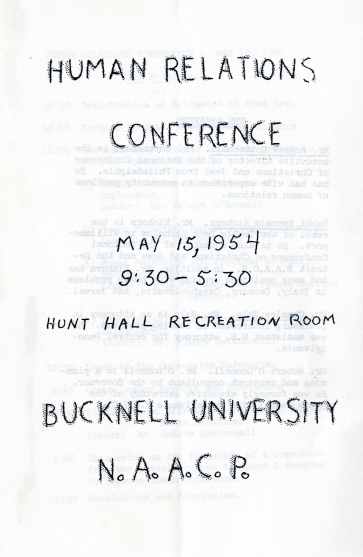
Human Relations Conference
The Human Relations Conference was held in Hunt Hall to discuss racial and religious discrimination in the Bucknell and Lewisburg communities. This conference program from May 1954 discusses human relations through BU’s NAACP chapter (National Association for the Advancement of Colored People). The purpose of the conference was to set up a committee in the Lewisburg area to help counteract this type of discrimination in the future. This conference had the support of the then-President of Bucknell’s NAACP chapter, James Justice, who wrote a letter that personally asks Forrest D. Brown to get involved. Brown was advisor/secretary for the University’s Christian Association and Bucknell’s Foreign Student Advisor from 1936-1966.
Civil Rights Roundtable
In the early ‘60s advertises for a roundtable discussion on the appropriate role for Bucknell in the Civil Rights movement. The discussion was led by a professor from Howard University, a historically black college founded in 1867 in D.C., who was also the President of the all-black Agricultural and Technical University (founded in 1891) of Greensboro, North Carolina.
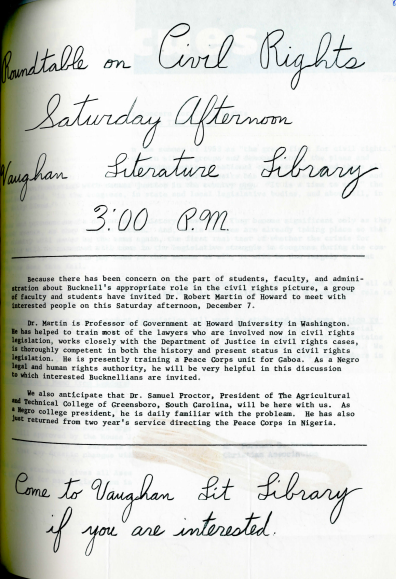
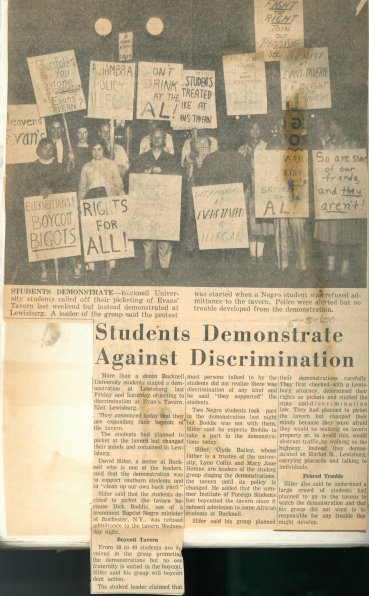
Student Demonstrations
In May 1960, a black student was denied entrance into Evan’s Tavern in East Lewisburg. This was an instance of segregation in Lewisburg and some Bucknell students held a demonstration in Lewisburg. They marched from campus into downtown, but they did not actually take their demonstration across the bridge to the tavern itself because they wanted to avoid the chance of any violence. A boycott of the tavern was organized as well.
Statement on Discrimination
This official university statement from 1965 discusses Bucknell’s intolerance of discriminatory practices by sororities and fraternities. This communication comes in response to a statement released by the United States Office of Education that any institution with fraternities or sororities must ensure that those organizations abide by the requirements outlined in the Civil Rights Act for avoiding discriminatory practices. Because Bucknell receives federal grants, the institution must annually certify its compliance with the provisions of the Civil Rights Act. While Bucknell’s intolerance of discrimination is noted as partially resulting from national legislative pressures, the administration does claim that discrimination of any kind is antithetical to the liberal spirit of the university, and has no place on campus. As such, the administration notes that all sororities and fraternities must submit statements certifying that they did not engage in discriminatory practices when making membership decisions in order to be officially recognized by the university for the following year. This communication demonstrates some of the national pressures exerted on Bucknell to comply with practices of equity and inclusivity.


Howard U. Exchange Student Received Unfriendly Reception
As of 1964, when this Bucknellian article is published, Barbara Beach is the first student to take advantage of the Bucknell-Howard Exchange program since Martha F. Brooks came from Howard to Bucknell in 1959. Howard University is a historically black educational institution in Washington, D.C. that was founded in 1867. After her experience, Martha wrote this letter, published in the Bucknellian both that year and five years later, stating that Bucknell is not ready for this type of exchange program. She did not have a welcoming and positive experience at Bucknell, and the writer republishing this letter 5 years later points out that this is only part of the reason Bucknell has a bad reputation among black students.
Questionnaire to Bucknell Students Concerning the Recent Southern Sit-in Strikes
This item contains the physical survey itself, while Item #50 reveals the responses. This survey was released to Bucknell students in 1960 to get an idea about their feelings and opinions on the Civil Rights movement, African American people, and integration in general. It asks about students’ awareness, desires, and limitations in the form of Yes or No questions.
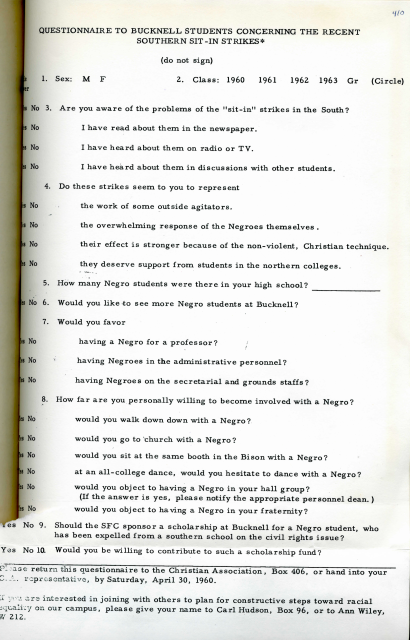
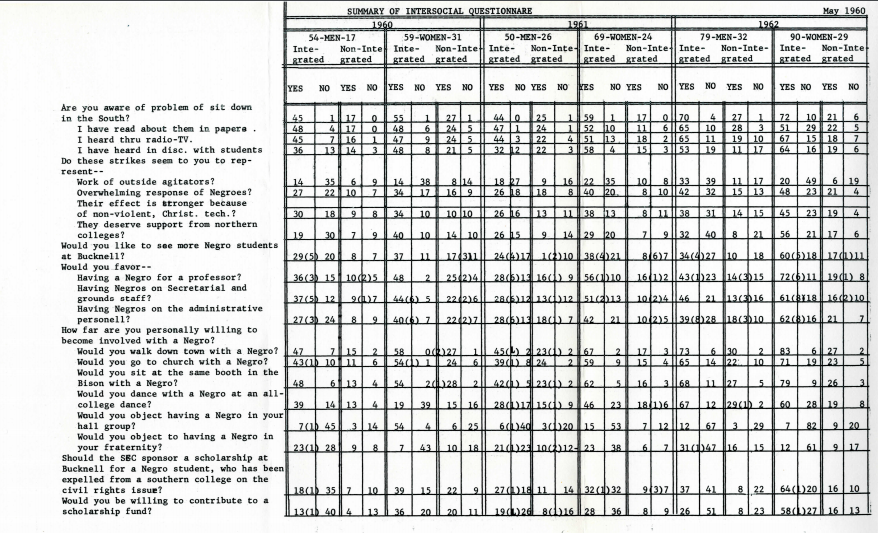
May 1960: Intersocial Questionnaire
In May 1960, a survey was released to Bucknell students in order to get an idea about students’ feelings and opinions on the Civil Rights movement, African American people, and integration in general. Interestingly, the responses were divided by those individuals who attended integrated versus segregated schools. Their variant feedback is telling and organized in table format.